woman & health









Jarred Evans gunned down while making sure others were safe
By LEANDRA ROLLE
Tribune Chief Reporter
lrolle@tribunemedia.net
JUST two days after celebrating his 21st birthday, Jarred Evans was gunned down outside a Cordeaux Street bar while reportedly trying to ensure his girlfriend and friends got inside safely, a final act of care that cost him his life. His girlfriend, Ciara
McKenzie, believes Evans wasn’t the intended target but a bystander caught in a burst of gunfire that turned their night of celebration into heartbreak.
The couple had been wrapping up a weekend of birthday festivities — his on Friday, hers on Sunday — that included a party, ATV rides with friends, and a
called over property
By LEANDRA ROLLE Tribune Chief Reporter lrolle@tribunemedia.net
BAHAMAS Nurses

“The public is therefore notified that Ms Muriel Lightbourn is no longer a member of the Bahamas Nurses Union and is not authorised to transact any business on the union’s behalf,” said BNU secretary general Shavonne Brennen
Union executives have declared that president Muriel Lightbourn is no longer a member of the union, accusing her of violating the union’s constitution, refusing to return property, and bypassing internal governance protocols.

Politics in the spotlight - but thousands on Labour march
By EARYEL BOWLEG Tribune Staff Reporter ebowleg@tribunemedia.net
THIS year’s Labour Day parade in New Providence drew thousands of workers and union members — but also sparked renewed
‘Stop S
debate about the role of political parties in what is traditionally a celebration of workers’ rights.
While both major parties participated, the Progressive Liberal Party’s (PLP) highly visible showing, complete with party shirts,
chants of “We are ready for war,” and a structured march led by Prime Minister Philip “Brave” Davis and Deputy Prime Minister Chester Cooper, was viewed by some as overly
By EARYEL BOWLEG Tribune Staff Reporter ebowleg@tribunemedia.net
EDUCATION Minister Glenys Hanna Martin has denounced the characterisation of Bahamian youth as “D average,” based solely on national examination results, describing the label as “unfortunate and unfair”. She urged those
perpetuating this “damaging narrative” to “cease and desist immediately”.
Addressing the House of Assembly on Thursday, Mrs Hanna Martin spoke candidly about the complexities facing today’s youth, emphasising the unprecedented social and developmental challenges confronting young people.
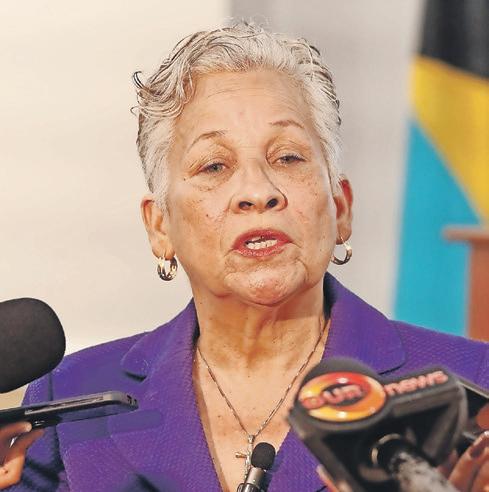
A MAN is in police custody and expected to appear in court today in connection with two shootings last week that left one man dead and four others injured. A police source confirmed the development to The Tribune yesterday. In Pinewood Gardens, shortly before noon last Monday, officers were alerted to gunfire in the area through ShotSpotter technology. They found a man inside a vehicle along Charles Saunders Highway with gunshot wounds. He was taken to hospital by ambulance, while
page five

final night out.
“We went to Enve and after Enve, we went Tipsys and he never made it inside,” Ms McKenzie said. “He was trying to make sure that everybody that we came with got inside but only me end up making it inside because right after, that’s when everything broke out.”
“The killers pulled up and he tried turning. He got hit, and one other gentleman got hit in his leg.”
Ms McKenzie ran outside in panic, only to hear the worst.
“His last words was, ‘baby, I right here, I got hit.’ When he got shot and, I ran outside, I was asking everybody for him, and I keep saying where Jarred and that’s what he said and then he was out of it.”
According to police, a group was gathered outside the bar just after midnight Monday when a darkcoloured Japanese vehicle pulled up. A man exited, drew a firearm, and opened fire before fleeing the scene.
Two men were taken to hospital. Evans later died
from his injuries, becoming the country’s 36th murder victim of the year, according to The Tribune’s records.
In a Facebook post filled with photos and videos from their final day together, Ms McKenzie shared her grief and her regret at not walking outside a moment sooner.
Still reeling from the shock, she said she couldn’t bring herself to wash his blood from her body.
“To me, for them to tell me that he was not responding, I didn’t want that blood to come off of me because I felt that was the only part of him I had left,” she said. “I did not go to bed. I stayed up all night. I did not stop crying. I feel like I was fighting for my life.”
She described Evans, a jet ski operator, as a kind, hard-working young man who loved his family and had big dreams: building a business, renting ATVs and scooters, opening a clothing store, and one day owning his own jet ski.
“He also wanted his own jet ski since he has been doing it since 2016,” she said. “He always had something on his mind.”

Fire damages Christ the King Anglican Church in Ridgeland Park on Sunday.
A FIRE tore through Christ the King Anglican Church in Ridgeland Park West on Sunday night, severely damaging one section of the building and leaving the remainder coated in soot and smoke.
Superintendent Quincy McGregor told The Tribune that Fire Services received the report at approximately 10.55pm. Upon arrival, crews found flames confined to the south-eastern section of the church. The cause remains under investigation.

“His last words was, ‘baby, I right here, I got hit.’ When he got shot and, I ran outside, I was asking everybody for him, and I keep saying where Jarred and that’s what he said and then he was out of it.”
By DENISE MAYCOCK Tribune Freeport Reporter dmaycock@tribunemedia.net
FORMER Commissioner of Police Paul Rolle, who was the head of the Royal Bahamas Police Force when Constable Robert Wright Jr’s death was ruled a suicide, is now distancing himself from the case after a Coroner’s Court jury ruled this week that the 23-yearold officer was murdered.
“It is unfortunate, the events surrounding that,” Mr Rolle told The Tribune on Thursday, following the jury’s verdict. “The matter was before the Coroner’s Court. It has obviously ruled so those that are responsible now. I have no dealings with that case, that was dealt with in Grand Bahama.”
rejected the police’s original determination and accused senior officials, including Mr Rolle, of mishandling the investigation.
Mr Wright Sr has also condemned comments Mr Rolle made in 2021 about men who died by suicide, which he believed were directed at his son.
“One thing, when my son was murdered, Paul Rolle was Commissioner of Police, and he went on national TV and said my son was weak. I will never forgive him for that. That’s my squadmate,” he said last week.
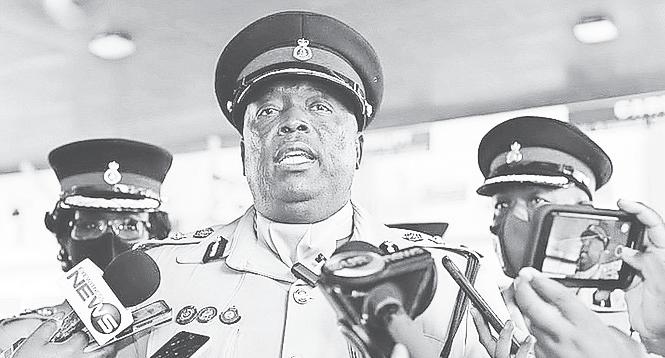
and later apologised for the generalisation.
“I never have no dealings with Robert Wright and his son, not with referring to his son as being weak,” Mr Rolle said on Thursday. “I think the matter has already been in the media.”
A video obtained by The Tribune shows the aftermath and includes an account from one of the church servers, who had returned to retrieve his grandmother’s hymn book. When he opened the door, he was met by thick smoke and zero visibility inside the sanctuary. Three fire trucks responded to the scene. Footage shows the church’s clerical office in ruins, with a large hole punched through the roof. The sacristy also sustained heavy smoke and heat damage. Water pooled along a hallway floor, and several areas will require deep cleaning and floor replacement. The pantry and the servers’ robing area were among the worst-hit, believed to be the fire’s point of origin. The rooms were blackened, with walls torn apart and piles of charred debris left behind.
The ruling brought long-awaited validation for Wright Jr’s family, particularly his father, retired officer Robert Wright Sr, who has consistently
The video further noted that the church would need to initiate immediate repairs, with plans underway to reorganise or rebuild key sections of the facility.
A MAN has died after falling from a tree at a residence in the Baillou Hill Road area.
Yesterday afternoon, shortly before 4pm, police received a report of a man on the ground in a yard appearing to be lifeless. Officers arrived at the scene, and emergency medical personnel confirmed there were no signs of life.
The man was not a resident of the property, and was said to be in his 40s.
Officers at the scene said that residents had
said the man was in the tree about 20ft high and fell, hitting the ground and collapsing.
Police advised anyone getting fruit from trees to “make sure it was safe”.
Officers said they had limited information so at this stage were not ruling out foul play and were also not ruling out the possibility that electric wires may have played a role.
Inspector Gerard Culmer said: “We are awaiting an autopsy so I don’t want to guess or assume what happened.”
Mr Rolle, however, denied ever referring to Wright Jr specifically. In early 2021, amid a public discussion on suicide statistics, he said: “We had a few of those that we know were domestic related where the fellas are weak and they killed themselves because they were having issues with their females.” He did not name anyone,
Constable Wright Jr was found dead on May 14, 2021, in his vehicle with a gunshot wound to the head. His service weapon was in his right hand. Police quickly classified the death as a suicide.
Mr Wright Sr has emphasised discrepancies he
believes point to foul play: the family — not police — discovered the body; photos differed on the location of the weapon; and the officer, who was lefthanded, allegedly had the weapon placed in his right hand in police images. He also cited the absence of his son’s bulletproof vest in official photos and mentioned an unverified tip about a police vehicle seen near the scene before a gunshot was heard.
“The murderer needs to be found,” he said.

in a joint statement supported by vice president Shenique Cox, assistant treasurer Maria Smith, and trustees Judyann Johnson and Alicia Farquharson.
The declaration follows months of internal strife over Ms Lightbourn’s leadership, a conflict that led to legal threats, the suspension of two BNU officials, and members changing the locks at the union’s headquarters. Police were sent to Ms Lightbourn’s home yesterday to retrieve union assets.
Union executives allege Ms Lightbourn failed to pay union dues for more than two years, a direct constitutional breach disqualifying her from membership. They claim she made no effort to rectify her standing through re-admission procedures.
Ms Brennen said the union’s constitution allows for reinstatement with a majority board vote and payment of a re-admission fee. “She made no attempt to do so,” she added.
Lightbourn’s leadership.
“To date, we, as an executive, are unaware of the financial state of this union,” Ms Smith said. “When we ask questions about it, it’s like nobody is answering and we’re not supposed to have the information.”
She alleged that significant funds were spent without board approval and that no monthly financial reports have been submitted since 2023. An annual audit was returned with “inconsistencies”, according to Ms Smith, who said plans to clarify the report were thwarted when Ms Lightbourn allegedly told the auditor she was the only one authorised to receive it.
Ms Lightbourn has denied the claim. “I never instructed the auditor to report solely to me,” she said, adding that financial meetings were held and two audits were conducted but not returned to her by the executive team.
it. I addressed my membership and all the accusations they’re having; I addressed the membership on it.”
She also questioned the timing of the dues allegation, saying: “If I did not pay the dues for 22 months, why are you bringing this up now?”
Tensions have been fueled further by internal accusations that Ms Lightbourn unilaterally raised salaries for herself and two others, while ending stipends for other members.
Ms Lightbourn rejected the salary claims as “deceitful”, explaining that her contract included allowances and that only one approved stipend increase was granted to the second vice president in Grand Bahama.
Nurse Johnson said: “I believe personally that she’s segregated the nurses. So, the relationship with the said president at the time and her executive was very estranged.”

In response to her removal, Ms Lightbourn called the allegations “disingenuous”, dismissed the claims as part of a longstanding vendetta, and insisted she remains the union’s president.
Lightbourn maintains the action was valid, asserting one suspended officer had submitted fraudulent resolutions.
Executives also raised red flags about the union’s financial health. Ms Smith warned the BNU risks deregistration due to its failure to file the required financial returns for 2023 and 2024. She claimed there has been a lack of transparency and accountability under Ms
“They would’ve done everything in the book to me,” she said. “I’ve never said a mumbling word to any of them. I went through
Executives also accused Ms Lightbourn of failing to advocate for nurses on unresolved matters, such as unpaid transportation mileage allowances owed to nurses in Grand Bahama and the Department of Public Health. The executive team claims Ms Lightbourn’s suspension of two board members was motivated by personal grievance. Ms
“A non-member cannot suspend or expel a financial member or make any decisions,” she said. “And also the votes that was carried, according to her, for the suspension for both myself and the first vice president, were not enough based off the constitution.”
Police who visited Ms Lightbourn’s home yesterday were reportedly told they could not retrieve the property without a court order. from page one
Ms Brennen, one of the suspended members, countered that the suspension process was unconstitutional. She argued Ms Lightbourn lacked standing as a nonfinancial member and said the vote count failed to meet the two-thirds requirement.
Executives are demanding the immediate return of all union property in Ms Lightbourn’s
possession, including two vehicles, outstanding Christmas vouchers, trophies, and other assets. They presented The Tribune with an April letter instructing her to vacate the office and return union items.
from page one
political.
In contrast, the Free National Movement (FNM) opted for a toned-down approach. Party members wore national colours rather than party paraphernalia. Opposition leader Michael Pintard said this choice respected requests from labour leaders and the family of the late Sir Randol Fawkes, who pioneered Labour Day in The Bahamas.
The difference in presentation brought partisan tensions to the fore, despite efforts by some officials to emphasise unity.
Defending the PLP’s participation, Mr Davis told attendees: “I make no apology, no apology for marching with workers, nor for my party marching alongside the workers of The Bahamas.”
He argued that Labour Day belongs to all Bahamian workers, regardless of political affiliation: “PLPs are workers. FNMs are workers. Labour Day belongs to the working people of this country.”
Mr Pintard used his remarks to emphasise inclusivity and dignity across all professions.
He also reiterated the FNM’s call for 80 percent local employment in foreign investment deals, promising that under his leadership, workers would not be “intimidated” based on political leanings or displaced by retirees returning to senior government posts.
Following the parade, Mr Davis switched from a PLP shirt to a neutral top to deliver his formal address, though he was later seen wearing party colours again at a birthday celebration nearby. He cited recent worker-friendly reforms, including the increase to minimum wage and efforts to reduce foreign labour dependency.
He also acknowledged the absence of the Trade Union Congress (TUC), which boycotted the parade, and extended an “open hand of dialogue” to its leadership.
“I hear your concerns, I respect your position,” he said. “Our differences can strengthen us if we allow them to bring clarity and conviction to our shared purpose.”
TUC president Obie Ferguson previously told The
Tribune the boycott was not political but rooted in frustration over stalled progress. He said the government had fulfilled fewer than ten percent of the promises in a signed MOU, calling it evidence of ongoing neglect.
Despite the boycott, some TUC affiliates still marched. Bahamas Electrical Workers Union (BEWU) president Kyle Wilson said he respected the TUC’s stance but believed the day ultimately belongs to the people.
“Labour Day is for the people,” he said. “Even though we have a leader in the TUC, I still have my own opinion. I still have my own views.”
BNATUC president Belinda Wilson also participated, though her involvement followed tensions with the PLP. She had earlier asked the party to remove her image from a Labour Day flyer. The PLP denied producing the flyer, but party chairman Fred Mitchell later posted a separate image with the caption “Shut up and March.” Mrs Wilson responded: “Well, I’m gonna march, but Belinda Wilson will also speak.”
Mrs Wilson said the incident didn’t affect the overall significance of the event, calling it an important day to honour workers and celebrate Sir Randol Fawkes’ legacy.
Present at the ceremony were Fawkes’ son, Dave, and his granddaughter. Mr Fawkes welcomed the political energy the day stirred, calling it a natural extension of his father’s legacy.
“Sir Randol said any publicity is good. The PLP and labour have intertwined over the years. You cannot have labour change without political change,” he said. “He fought for one man, one vote, majority rule, women’s rights. All these would not have happened without political change.”
Labour and Public Service Minister Pia Glover-Rolle, who wore a non-partisan shirt designed by Industrial Tribunal president Indira Francis, used her speech to highlight progress under the current administration.
She said 56 union agreements have been signed in the last three years, delivering over $40m in benefits to workers.
She rejected claims
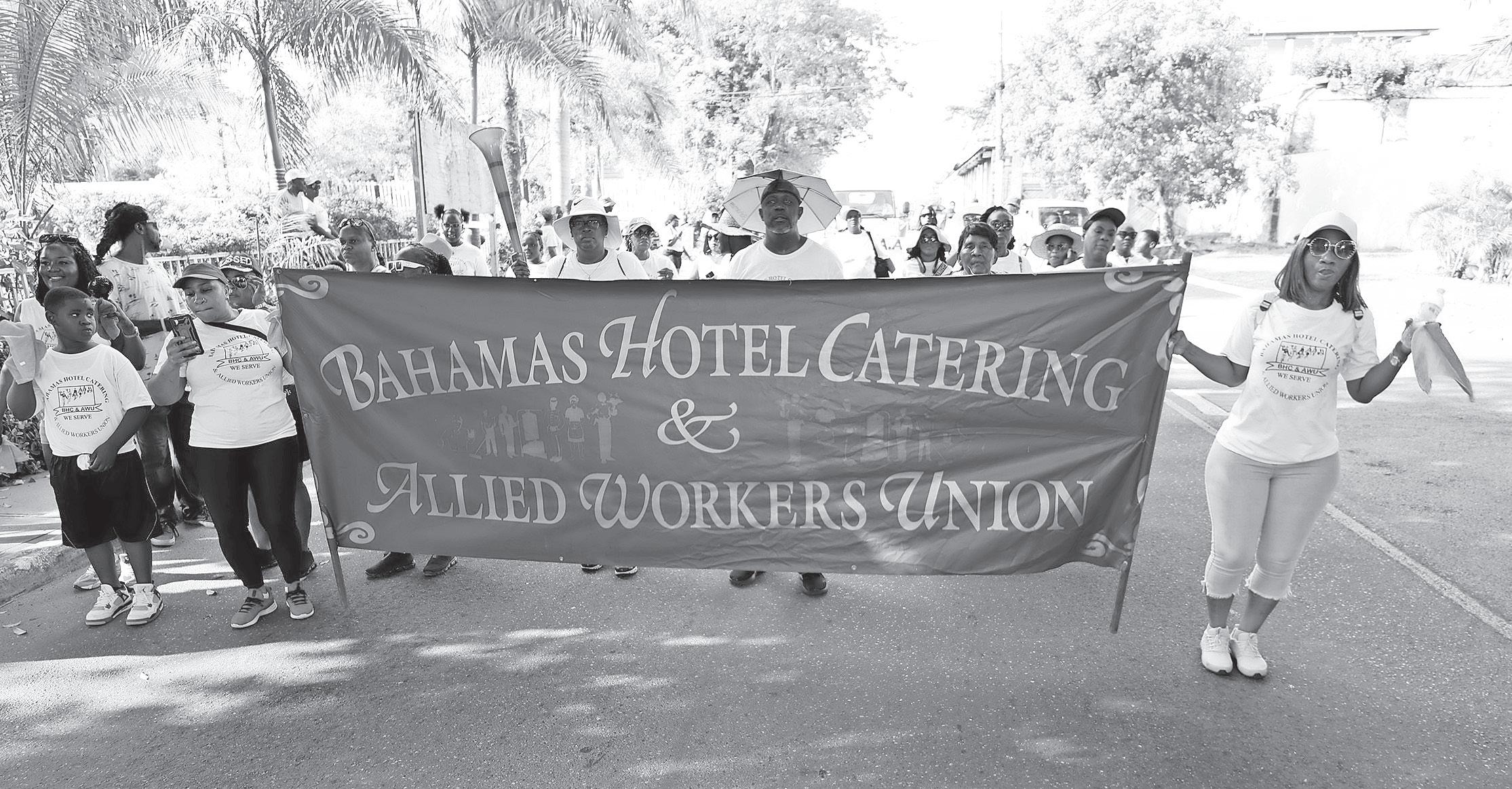
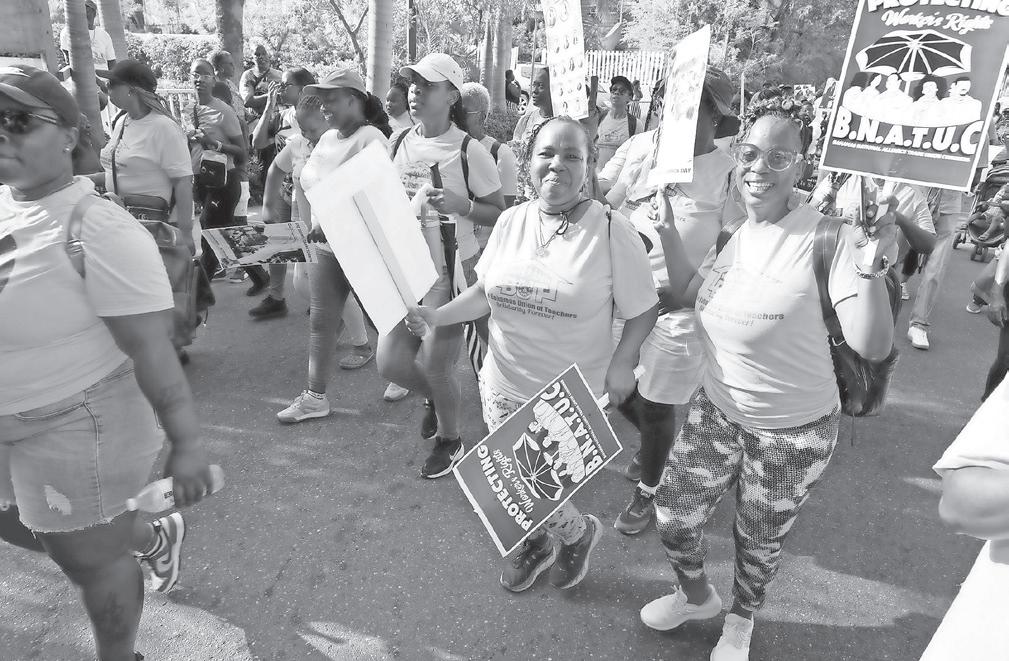
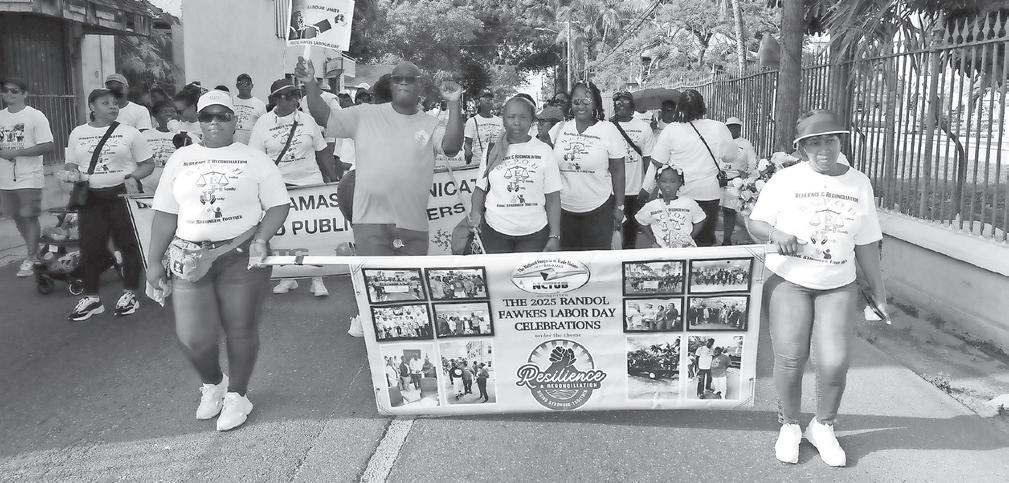
of government inaction, saying: “Now don’t say that you want to speak to the unions when you push them away from the table the years previous.” Additional details, including salary increases for public servants, will be outlined in her upcoming budget communication.
Despite boycotts and political friction, National Congress of Trade Unions (NCTUB) secretary general Daniel Thompson said the day was ultimately a success.
“Though there was much noise in the market about their non-participation, at least three to four affiliates were present,” he said.
“That speaks volumes of the unity that exists when it comes to issues related to the workers.”

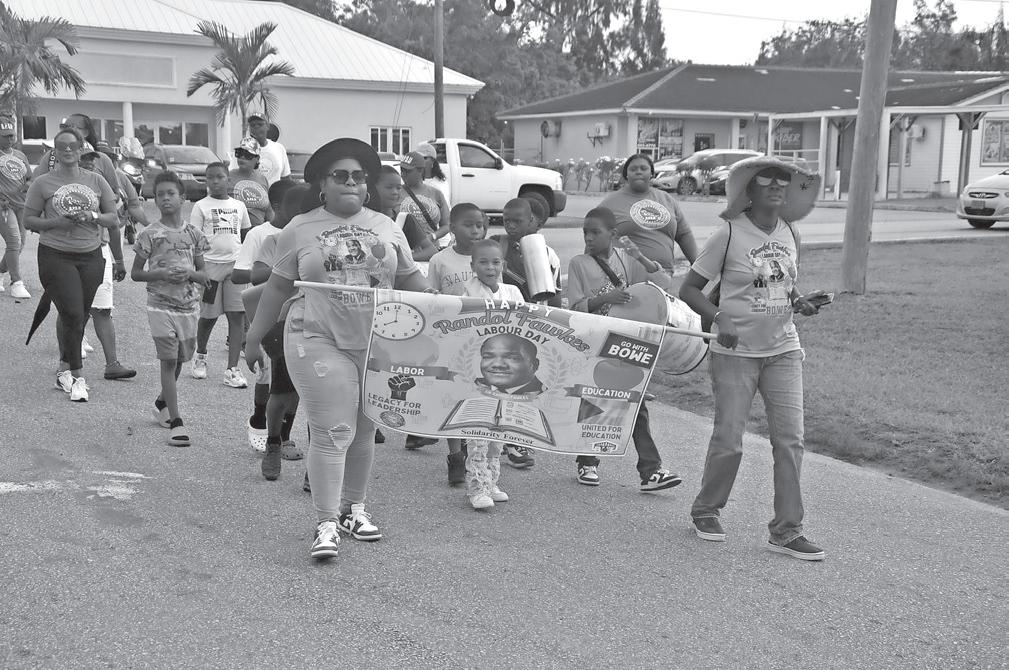




from page one
“The obligation rests with parents, communities, the church and the state to provide the necessary support and implement policies that help our young people transition safely and wholly into adulthood,” she said.
“We must protect and nurture and place the highest value on our young people. We ourselves must take responsibility for much of the challenges that our children and young people face. Don’t point the finger — look in the mirror.”
Referencing recent research from Harvard University, Mrs Hanna Martin underscored that adolescence is a uniquely vulnerable period. The study, published in Harvard Magazine, explains that teenage brains are still in development. Key regions — especially the frontal lobe, responsible for judgment and planning — are among the last to mature, making adolescents more prone to impulsivity and external influence.
Neurologists behind the study advocate for increased public awareness, arguing
that understanding adolescent brain development is critical to helping teens overcome challenges and recognise their potential. In response to the “D average” narrative, the minister highlighted improved performance in the 2024 Bahamas Junior Certificate (BJC) and Bahamas General Certificate of Secondary Education (BGCSE) exams. Notably, 653 BGCSE candidates earned grades of C or higher in at least five subjects, an increase from 544 in 2023. Meanwhile, 1,009 students attained a minimum of five D grades, up from 901. In core subjects, 431 candidates earned a C or better in Mathematics, English, and Science, up significantly from 303 last year. For the BJC, results were mixed. While 1,388 students achieved five or more C grades—down slightly from 1,417 in 2023 — those earning at least five D grades rose to 1,948 from 1,945. However, there was a dip in students earning a C or higher in Mathematics, English, and Science: 1,298 compared to 1,402 the previous year.
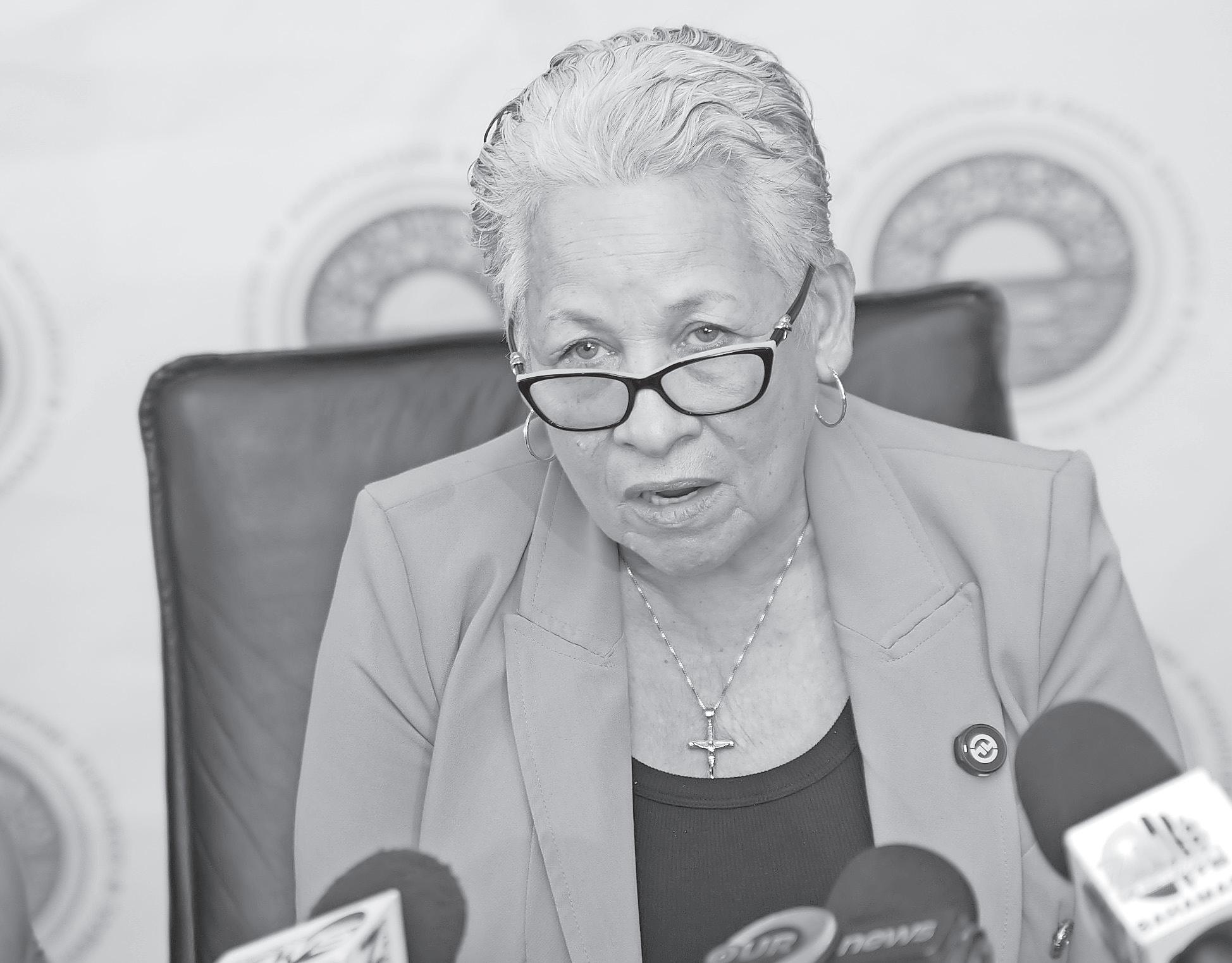
By EARYEL BOWLEG Tribune Staff Reporter
EDUCATION Minister
Glenys Hanna Martin has announced a new security protocol for the upcoming school year: a student identification card system designed to restrict school access exclusively to authorised individuals.
Revealing the plan in the House of Assembly on Thursday, Mrs Hanna Martin outlined a strategy focused on identification and access control, emphasising the need to safeguard “sterile zones” on school campuses.
“These protocols will ensure that only individuals authorised by school executives will be allowed
entry to ‘sterile zones,’” she said. The Ministry of Education is collaborating with the Department of Information and Technology to implement the new ID system. She said the ID cards will include critical personal and academic information about each student, adding that
such measures are now essential.
“These measures have become necessary in light of a number of incidents involving unauthorised entries by students and adults that compromise school safety,” she said.
The minister underscored that schools must be zero-tolerance zones for threats and
unauthorised activity.
Consequences for student misconduct may include assignment to suspension centres, participation in Programme Sure, or, in severe cases, placement within the juvenile justice system.
Mrs Hanna Martin also reported that schoolrelated incidents declined by 17 percent nationwide
last year, attributing the improvement to coordinated efforts among School Resource Officers (SROs), security personnel, administrators, and parents.
While data for the current academic year is still being compiled, she noted a visible decline in fights and other on-campus disruptions.
By LEANDRA ROLLE Tribune Chief Reporter
lrolle@tribunemedia.net
THE Ministry of Social Services is reporting a disturbing rise in cases of mothers prostituting their daughters — some as young as 14 — in exchange for money to pay household bills, according to Minister Myles Laroda.
While no official statistics were provided, Mr Laroda said victims are typically between 14 and 16 years old.
“Lives are being destroyed before they begin to live them,” he said during his budget contribution in the House of Assembly on Thursday.
“While the age of consent is 16, using a minor for the sexual gratification of an adult constitutes prostitution and rape, which are criminal offences and should be reported to the police.”
He urged anyone with knowledge of such cases to contact the ministry’s hotline at 711 or report the matter to police.
He also highlighted a series of other troubling trends, including a rise in juvenile delinquency, primarily driven by serious behavioural issues. He said data from the Child Protection Unit identifies neglect, largely due to poor parental supervision, as the most prevalent form of abuse.
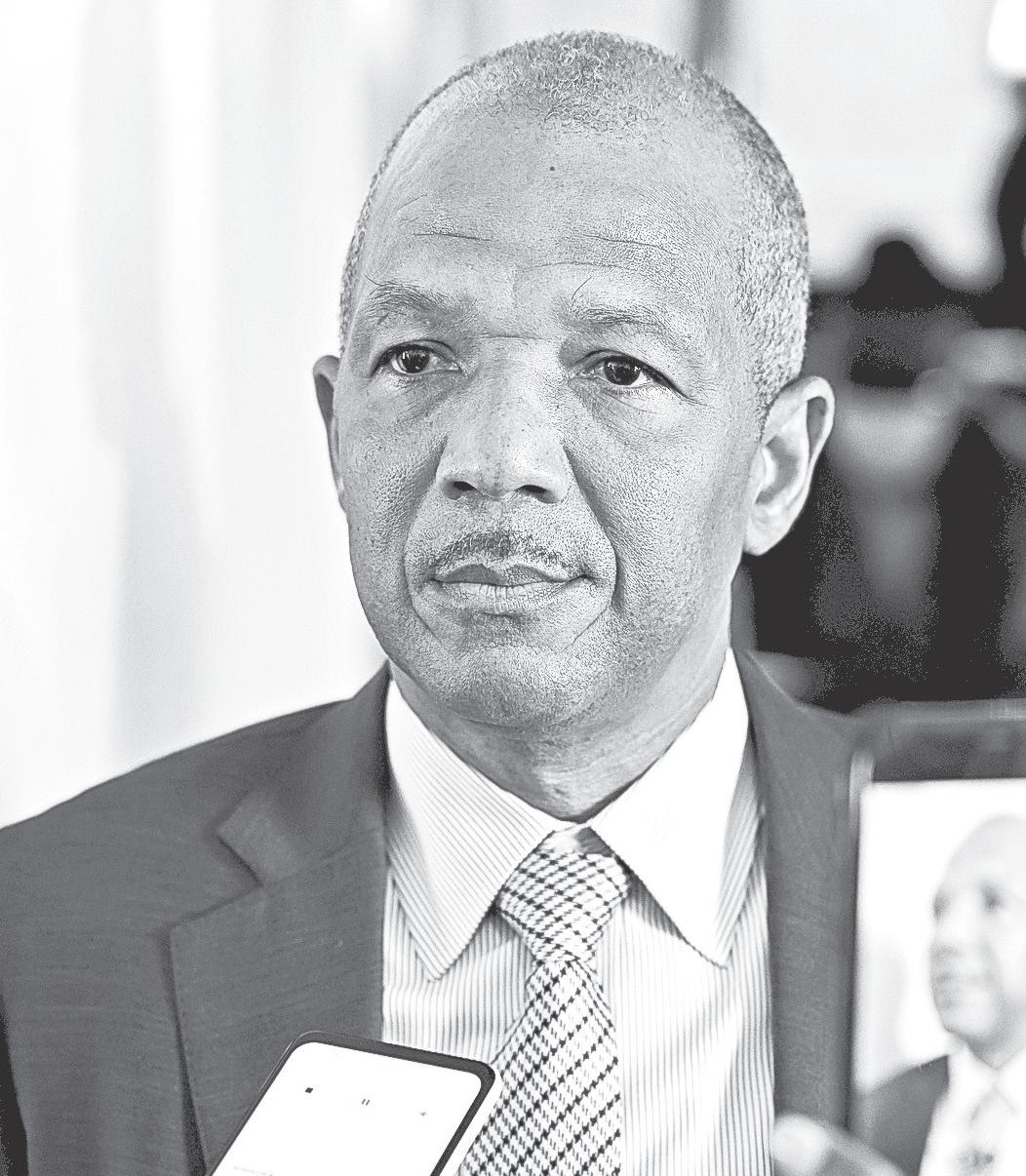
Another persistent issue is the failure of many fathers to provide child maintenance.
“Usually, lack of child
support and lack of child involvement, go handin-hand,” he said. “This is another contributing factor to juvenile delinquency. Fathers, you play a key role in your child’s development. Therefore, I implore you to take your
responsibilities seriously.”
On domestic violence, Mr Laroda confirmed that referrals continue to pour in from victims fleeing abusive households, underscoring the pressing need for more shelter space. While some
temporary accommodation is being provided, he admitted it is not enough to meet the growing demand.
The ministry plans to partner with police on a one-stop-shop initiative to better support victims and help them rebuild their lives.
Despite widespread reports of child abuse, domestic violence, and shelter shortages, Mr Laroda provided no update on the long-stalled implementation of the Protection Against Violence Bill. Passed over a year ago, the legislation mandates the formation of a commission to support victims, aid police in cases of limited cooperation, and develop a national strategy for violence prevention.
To date, the commission has not been established, and the government has offered few updates, prompting criticism from local advocacy groups and members of the Parliamentary Human Rights Committee (PHRC).
PHRC deputy chair Senator Michela Barnett-Ellis acknowledged the delay last month and expressed hope that the committee’s involvement would help move the process forward.
Mr Laroda noted that demand for social assistance, including shelter, remains high. He admitted officials are sometimes forced to turn
people away due to lack of space.
He also revealed that the number of children in state-run shelters has grown significantly over the past year, though he did not provide specific figures. While women remain the majority of applicants, there has been a noticeable rise in men and unemployed individuals seeking help.
“I therefore appeal to corporate Bahamas and faith-based organizations to make long-term investments in such ventures,” he said. “While seasonal giveaways and similar goodwill projects are important and greatly appreciated, there should be a focus on sustainable and permanent solutions to address homelessness and housing insecurity.”
He said plans are underway for a nationwide survey to determine the scale of homelessness in The Bahamas.
Mr Laroda also pointed to the launch of the annual National Women’s Symposium, which attracted between 700 and 1,000 participants and featured 40 exhibits. He said the event included an educational forum on the Protection Against Violence Act, where stakeholders, survivors, and victims shared candid insights and proposed solutions to the challenges facing women in the country.

NULLIUS ADDICTUS JURARE IN VERBA MAGISTRI
“Being Bound to Swear to The Dogmas of No Master”
LEON E. H. DUPUCH
Publisher/Editor 1903-1914
SIR ETIENNE DUPUCH, Kt., O.B.E., K.M., K.C.S.G., (Hon.) LL.D., D.Litt .
Publisher/Editor 1919-1972
Contributing Editor 1972-1991
RT HON EILEEN DUPUCH CARRON, C.M.G., M.S., B.A., LL.B.
Publisher/Editor 1972-
Published daily Monday to Friday
Shirley & Deveaux Streets, Nassau, Bahamas N3207
TELEPHONES
News & General Information
(242) 502-2350
Advertising Manager (242) 502-2394
Circulation Department (242) 502-2386
Nassau fax (242) 328-2398
Freeport, Grand Bahama (242)-352-6608
Freeport fax (242) 352-9348 WEBSITE,
www.tribune242.com


IT is very clear – indeed, it has been clear for some time – that no matter what words this administration may say about the importance of transparency and accountability, its actions are very different.
As we noted in this column last week, the government of Philip “Brave” Davis continues to show nothing more than lip service, and barely even that, to the concept of freedom of information.
For the second year in a row, the budget allocated to implementation of the Freedom of Information Act is just $140,000 – far less than what would be needed to make meaningful progress on giving people access to information.
This time, however, Mr Davis is pouring scorn on top of that meagre allocation, dismissing the importance of such legislation and indeed contradicting what the law itself would allow. He said: “It doesn’t make available matters that’s not already available to the public, right?”
Well, actually, as Mr Davis well knows, one would imagine, it grants Bahamians and residents the right to request information held by public bodies, outlines procedures for requesting information and includes mechanisms for appeal in cases of denial.
Then there is the much vaunted anti-corruption committee that was this government’s solution in the face of calls for a commission of inquiry to deal with allegations arising from a US indictment that named Bahamians as
part of a wide-ranging cocaine smuggling ring and saw serving officers in the ranks of the police and defence force named or arrested.
Instead, there was the independent commissions bill, which would have oversight and an independent commissioner able to investigate misconduct.
What budget did that get? $30,000. Barely enough to put a sign on an office and letterheads on paper.
How about the Ombudsman office, there to ensure government accountability? Budget? $39,890. Will that even pay for someone to take your call?
Add to that the continuing lack of respect for the law already in place with regard to public disclosures by parliamentarians – we still know next to nothing about this year’s declarations long after the deadline – and the pattern is clear. When it comes to transparency and accountability, this government is not interested.
A reminder, by the way, who it was that put the pressure on this administration with regard to delivering transparency – it was Mr Davis himself.
In his very first speech as prime minister, he said: “I also commit to lifting the veil of secrecy on that which has gone before us, so that all of the arrangements under which we have to live are transparent, and those who authored them are accountable.”
As it says in Matthew 7:16, “You will know them by their fruits.” Transparency and accountability are rotting on the vine.
EDITOR, The Tribune.
APPeALS on social media recently, about shortages of blood at “the National Blood Bank”, have been legion. Mostly, the name of a needy patient has been mentioned, as well as the blood type needed. Yet the shortage persists and on Friday last we lost a very fine lady, and a friend of many, very likely because of urgently needed surgical delays because the Blood Bank was dry.
So, what is the problem and why can’t we fix it?
Perhaps some investigative reporting might help. Whoever is in charge of the “blood bank” must, or should have, the names and contact details for blood donors over the last ten to twenty years. Why can’t these people be contacted and asked to donate? Also, we have two, uniformed branches of Government, of
perhaps several hundred of theoretically very fit and able-bodied men and women, in the RBPF and RBDF and one wonders why we have not encouraged them to donate blood on a regular basis. Their jobs, by definition, already put them in mortal danger. Giving blood in an armchair should be child’s play. And have we considered the difficulty today, of getting to one of the only two places, that to my knowledge, one would go to donate blood. Princess Margaret Hospital or Doctors Hospital. There is no easy public access, nor parking, at either one of these places. So why not arrange with the plethora of medical clinics that now abound across this island and allow them to take donations of blood on behalf of the blood bank. I imagine that they would have all of the required skills and equipment to


EDITOR, The Tribune. I HAve never been a fan of Obie Ferguson. His tactics can be loud, his politics questionable, and his leadership style leaves much to be desired. But let me be very clear—the Trade Union Congress’ (TUC) decision to boycott Sir Randol Fawkes Labour Day should not be dismissed as petty or political. It is, in fact, a desperate response to something very real: a country that is no longer listening to its workers.
perform this task. And if they feel they need a fee to do so, perhaps deduct the cost from their vAT. The blood bank of course would have to collect the donated blood and paperwork, just like the armored trucks that collect cash from the grocery shops. And there is nothing wrong with that because both DHS and PMH have overhead costs that they are paying right now. Perhaps we could give them a vAT bloodbreak too.
The lady of whom I write is perhaps only one of many, who have died for lack of available blood at the blood bank. This is lunacy in my view and is such an unnecessary outcome of our Ministry of Health and, dare I say, Wellness. This must be resolved urgently.
BRUCE G RAINE Nassau, June 8, 2025.
Labour Day is not about personalities. It is not about Obie Ferguson. It is not about party loyalty. It is—and must always be— about the men and women who build this nation brick by brick, shift by shift, service by service. When the TUC pulls out of Labour Day, that is not just a scheduling issue.
It is a national alarm bell, ringing with the pain and exhaustion of Bahamian workers across every industry. And if we are too distracted by political theatrics to hear it, then we have already failed them.
United Artists Bahamas recently spoke out about the exploitation and corruption in the music industry. Our Bahamian musicians are being pushed to the side, denied stages at major hotels like Atlantis and Baha Mar—venues that should be celebrating our culture, not suppressing it. Instead, foreign acts are flown in and celebrated while local talent fights for crumbs. The very people who give The
Bahamas its voice and rhythm are being muted in their own country. Meanwhile, our young teachers—barely earning enough to survive—are being sent to the Family Islands without adequate support. Rent is higher. Supplies are limited. Yet the government offers no real compensation for the added burden. These teachers are paying out of pocket in many cases, just to do their jobs. This is not opportunity—it is neglect.
And what of the vendors at RM Bailey Park? Their fees have been raised without justification. They have no permanent shelter, no working bathrooms, and no way to protect their livelihoods when it rains. They are left to fend for themselves under flimsy tents, treated like a nuisance rather than small business owners helping drive the economy. The nurses? every summer it’s the same story: sweltering heat, broken air conditioners, and unsafe working conditions. These are the professionals who care for our most vulnerable, forced to endure physical strain just to show up and do their jobs. It is disgraceful.
The Minister of Labour claims to be regularly updated and in close contact with the unions. If that’s true, why are the workers still shouting to be heard? Why does “we’re working on it” always drag on longer than necessary? Delay tactics have become policy. Indifference has replaced leadership. Labour Day is not supposed to be political theater. It is supposed to be a day of truth—a day when we confront the harsh realities faced by the people who power this country. And whether or not we like the voice speaking that truth, we owe it to our workers to listen.
This is not about Obie Ferguson. This is about musicians, teachers, nurses, vendors, and so many others who are struggling to be seen and heard in a country that claims to value them. The TUC boycott is not the threat. The real threat is the silence we have grown far too comfortable with. If we cannot hear the cries of our workers now, we may have nothing left to celebrate by next Labour Day. It’s time to act. Not for politics. Not for optics. But for the people who carry this country on their backs, every single day.
Government officials, of course, don’t share these burdens. They don’t work in overheated rooms or use makeshift bathrooms. When they fall ill, they can afford to go abroad. But those they govern cannot—and are left with deteriorating public services and empty promises.
WILLIAM GRAY June 9, 2025.
By LYNAIRE MUNNINGS Tribune Staff Reporter lmunnings@tribunemedia.net
THE Bahamas Department of Corrections (BDOC) has expanded its senior leadership with the appointment of seven new assistant commissioners, one of whom was honoured posthumously.
Among those appointed is the late Bradley Rahming, a long-time corrections officer who passed away late last year after serving for more than two decades. The other appointees include Gregory Williams, Philip Hanna, Stephanie Pratt, Monique Greenslade, Rolean Forbes, and Foster
Ferguson. All were promoted from the rank of chief officer and joined the existing complement of four assistant commissioners of corrections. Commissioner of Corrections Doan Cleare made the announcement during a staff ceremony held on Thursday, describing the appointments not as traditional promotions but as strategic placements based on leadership needs and personal recommendations to the minister of national security and the prime minister. Mr Cleare paid a deeply personal tribute to Mr Rahming, calling him a loyal and hardworking officer who served 21 years
as a principal corrections officer without complaint or promotion until shortly before his death.
“He never complained, never even talked about it. He did his work religiously,” Mr Cleare said, recounting how he promised Mr Rahming that he would one day be made assistant commissioner.
“Even in the grave, he’s assistant commissioner,” he added.
Minister of National Security Wayne Munroe, KC, applauded the appointments and the department’s ongoing reforms. Mr Munroe added that the prime minister has emphasised two pillars of the
national crime plan as being especially important — prevention and rehabilitation — and pointed out that BDOC is deeply engaged in both.
He said that the work done by correctional officers is often overlooked because they operate behind the walls of the prison, unlike their counterparts in the police or defence force.
While specific portfolios for the new assistant commissioners have been assigned, the full list will not be made public until next week. Mr Cleare acknowledged the heavy workload previously carried by a handful of senior officers, noting that the
restructuring will allow for more balanced distribution of responsibilities.
Mr Munroe also addressed a long-standing frustration within the public service: the slow pace of promotions. He candidly admitted that during his time as minister, several officers were only promoted posthumously due to bureaucratic delays.
He acknowledged the tragic nature of that reality, noting that, at the very least, the retroactive nature of promotions allows the estates of deceased officers to benefit.
Looking ahead, Mr Cleare announced plans to appoint three more assistant commissioners as part of the department’s transition plan. He acknowledged his impending retirement and stated that the appointments were part of ensuring a capable and well-structured leadership team for the future.
“It is a crying shame that the strictures of the Public Service have resulted in the promotion of, I think, three or four correctional officers, and it ended up being posthumously,” Mr Munroe said. “Because you start when the person is alive, and the public service process takes so long that sometimes people pass away before they can get the rank.”
By DENISE MAYCOCK Tribune Freeport Reporter
dmaycock@tribunemedia.net
A 22-yEAR-OLD Grand Bahama man has been sentenced to more than 18 years in a US federal prison after being convicted of sexually exploiting a child and distributing explicit child abuse material online.
Chrystano Peder Carmelo Cooper, a Bahamian national studying in Oklahoma on an F-1 student visa, was sentenced to 220 months after being found guilty on four counts
related to the sexual abuse and exploitation of a minor.
According to the US Attorney’s Office, between December 2022 and February 2024, Cooper coerced a minor into producing and sending sexually explicit images over the internet while enrolled at a college in Eastern Oklahoma. A forensic search of his mobile device uncovered multiple files containing child sexual abuse material.
The investigation began with a tip submitted to the National Center for Missing and Exploited Children,
By PAVEL BAILEY Tribune Staff Reporter pbailey@tribunemedia.net
A MAN was granted bail last week after being accused of threatening a woman with a handgun in May.
Theron Taylor, 30, was arraigned before Senior Magistrate Algernon Allen Jr on a charge of assault with a deadly weapon.
Prosecutors allege that Taylor assaulted Charamone Simmons with a handgun on May 25 in New Providence.
Taylor pleaded not guilty.
He was granted $7,500 bail with one or two sureties. As part of his bail conditions, Taylor must report to the Wulff Road Police Station every Thursday by 6pm and will be fitted with a monitoring device.
He was also warned not to interfere with the complainant or any witnesses or risk having his bail revoked.
Taylor’s trial is set to begin on July 17.
K Butler represented the accused, while Sergeant 3004 Forbes served as the prosecutor.
By PAVEL BAILEY Tribune Staff Reporter
pbailey@tribunemedia.net
A MAN was sentenced to two years in prison on Wednesday after admitting to possessing a loaded gun in New Providence last week.
Keno Johnson, 34, was arraigned before Magistrate Lennox Coleby on charges of possession of an unlicensed firearm and possession of ammunition.
His arraignment had been delayed by a day due to his need for medical attention.
Johnson was found in possession of a black .45 pistol and eight rounds of ammunition on June 1.
He pleaded guilty to the charges and was sentenced to serve two years at the Bahamas Department of Correctional Services. Inspector Lincoln McKenzie served as the prosecutor.
Man f ined for failure to declare $18k on departure
By PAVEL BAILEY Tribune Staff Reporter pbailey@tribunemedia.net
A MAN was fined on Thursday after failing to declare that he was leaving the country with over $18,000 last week.
Maxene Vermilus, 46, was arraigned before Senior Magistrate Kendra Kelly-Burrows on a charge of failure to declare.
He was arrested at Lynden Pindling International Airport on June
3 after failing to inform a customs officer that he was travelling with $18,492 in cash — well above the $10,000 legal threshold. Although Vermilus pleaded guilty, he claimed to have receipts showing that part of the money came from his bank account. He was fined $500 or face two months in prison. Additionally, the full $18,492 seized at the airport was forfeited to the Crown. Sergeant Vernon Pyfrom served as the prosecutor.
which triggered a probe by Homeland Security Investigations (HSI).
Cooper was convicted by a federal jury on November 14, 2024, on charges of Sexual Exploitation of a Child / Use of a Child to Produce a Visual Depiction, Distribution of Child Sexual Abuse Material,
Receipt of Child Sexual Abuse Material, and Possession of Child Sexual Abuse Material.
“This sentence is proof that this defendant’s perverse behavior of sexually exploiting a child will not go unpunished,” said Travis Pickard, Special Agent in Charge, HSI Dallas.
“Thanks to a Cybertip from the National Center for Missing and Exploited Children, this child predator will be incarcerated, allowing the minor victim he abused to begin the healing process.”
United States Attorney Christopher J Wilson added: “The US Attorney’s Office is committed to working with our law enforcement partners to aggressively prosecute those who exploit and victimise children.”
Following the completion of his prison sentence, Cooper will be deported and required to register as a sex offender.

ThroughouT our lives, we’ve been part of an unjust system that perpetuates a divide where those with power are given preferential treatment while the rest are left out.
This system, which raises a crucial question: is a qualification truly the best measure of understanding, or is it a privilege reserved for those who can afford it, is a stark reminder of the inequality that persists in our society. This injustice, which should not be tolerated, demands immediate and radical change. only white-collar professions are given any respect, but blue-collar professions, such as electricians, plumbers, carpenters, mechanics, and those involving manual labour, are often frowned upon. These are the professions that keep our society running, yet they are not given the same level of recognition as those that require academic qualifications. Let’s not forget the crucial roles of farmers, factory workers, and other skilled labourers who contribute significantly to our society.
Looking back at history, we remember a time when education was a luxury, a privilege denied to the less fortunate. Some of us went to school, and many of us were forced to go to work early. The old system made it nearly impossible for the underprivileged to break through. Yet, there were those who, against all odds, managed to rise to the top, their resilience and determination serving as a beacon of hope and inspiration for us all.
The divide in education led to a loss of self-esteem among those who couldn’t afford private schools, perpetuating a sense of inferiority complex. Private and privilege have been intertwined, even though that was not entirely true. Indeed, we can find many examples of students who came from the bottom rung of the ladder and went on to excel, no matter the obstacles. Therefore, having academic qualifications does not and should not
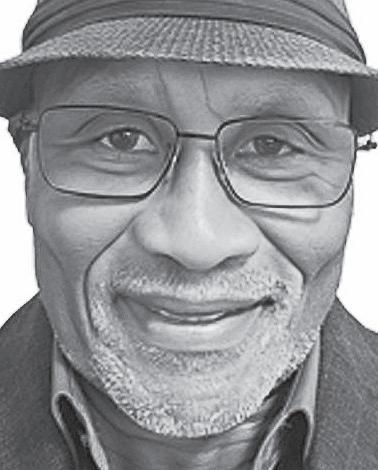
By Ivo I ne Ingraham
give anyone an advantage, nor should a person who has been on the job and acquired a wealth of knowledge be at a disadvantage. Therefore, to achieve a certain mindset or conformity, college degrees were used as the yardstick to determine who would be hired and who would not. This process, often referred to as “brainwashing”, was not a literal process but a figurative one, where societal norms and expectations were reinforced through the education system, thereby perpetuating the societal divide. This game plan is played out on many fronts. Who would be approved by the bank, and who would be allowed to live in certain areas? It also selected who could join specific organisations who were not eligible. So, attending college has been the method used to reveal what was there and who was not—hats off to those who were disciplined enough to pursue higher learning. Life would eventually prove that many who were given preferential treatment due to socioeconomic advantages would secure better jobs. however, as life ultimately showed, people with degrees are not always the wisest.
In the civil service, the people who do the work are those who have been trained, and many who come with degrees and an attitude are oblivious to the

work. Those with degrees often believe that they should be ceremoniously given top jobs with top pay, regardless of their lack of experience. however, there are also many complaints from individuals who do not want to return home because they are not being paid commensurate with their qualifications.
Today, we witness numerous instances where individuals exploit the system to obtain degrees they don’t deserve. With the right connections, such as influential family members or friends, one can manipulate the system and get a bachelor’s degree with little knowledge. Many have acquired several degrees at a rapid pace, enabling them to pressure the system for higher pay. This is evident in cases where individuals with powerful connections secure admission to prestigious universities or obtain degrees online without meeting academic standards.
one often looks in many areas of the public and private sectors and
experiences co-workers who cannot spell simple words or reason sufficiently to help solve a simple problem. It is also shameful that in some jobs, the supervisor knows less than their subordinates.
It is disconcerting how an employer can hire a college graduate whom an employee must train to supervise them. It is too commonplace for pressure on subordinate employees to be used as a means of threatening compliance. Strangely, the old measuring stick used to hire only reveals that people with the most degrees and who brag about attending Ivy League colleges do not necessarily produce the best results.
We have numerous examples of individuals in current jobs, particularly in the government, being paid top dollar despite academic qualifications, yet they are not meeting expectations.
The hiring practices that apply enormous pressure to our young adults to hold a truckload of degrees are only in place so that they can cherry-pick who

they would hire, and many times, they pick a friend or family member who comes in under the radar. This nepotistic approach to hiring not only undermines the merit-based system but also perpetuates inequality and limits opportunities for those who are not part of the inner circle. We must find another way of determining who is the best and who can be trained. We all know that qualifications do not necessarily mean one is qualified because they must be inextricably linked to capability. however, the potential for a more equitable system, where capability is the primary measure of qualification, should inspire hope and determination in us all.
The morale in the workplace can be significantly higher if employees are paid according to their performance rather than their qualifications. It is no secret that people with big titles and walls covered with certificates are not necessarily high achievers. Instead of rewarding titles and qualifications, we should consider a system where pay is directly linked to performance. This would not only motivate employees to perform better but also ensure that those who do the work are the ones who are rewarded.
The government is a great place to start; promotions are not given based on performance but instead on who knows the senior people. This is no joke, but the potential for better service is excellent, morale is high, and productivity is even higher when the staff is satisfied. Many are being paid for doing nothing, which significantly impacts the morale of those who are working hard.
The propensity to have a “government job”, for the most part, has nothing to do with them wanting to contribute to nationbuilding. They want the job because they believe they can get away with inferior behaviour, such as arriving late to work, using their cell phone all day, taking early lunch breaks, leaving work early, doing nothing, and still getting paid. This perception is a reality for some, who believe they can get paid for doing nothing, which is what drives people to seek employment with the government.
The career civil servant who goes beyond the call of duty is becoming extinct. The group working for the betterment of the country is retiring at a rate not commensurate with the number of patriots being replaced. This crew is not comprised of graduates from Yale and harvard but rather those who came up through the ranks, learned their craft, perfected it, and took pride in their execution.
This crew was trained on the job. They are our best sons and daughters. The most excellent qualifications are the experience gained on the job; a university cannot provide that. This crew enjoy their work and produce without any of the modern tools we have today. They are the same people who are forced to train university graduates who are paid more than they are. This is not right, and there must be a happy medium that can be struck for those retiring to feel like they’re not taken advantage of in the end.
Indeed, many individuals employed in government for decades may not be working and may not be qualified, which should not prevent a skilled and qualified employee who goes beyond the call of duty from receiving their just reward. That also is just not right. having numerous qualifications does not necessarily translate to being able to adapt or perform effectively. So, while there are expectations from holders of various degrees, how do we justify why those who have been doing the work for all these years are still unable to receive half of the salary, including training others?
The playing field is never going to level, but it is disheartening and disrespectful for anyone to believe that the employees who have been keeping the boat afloat should accept less than they deserve. Therefore, those who concluded that people with the highest qualifications should be paid handsomely, how much should the people doing all the work be paid? There are many instances of people who scream out their qualifications before they introduce themselves, and these individuals are often challenged by the simplest chore of filling out an employment application.
Facing reality, this reasoning came from a “dropout”, as I never failed any BJC, BgCSE, or XYZ examinations because I never took one. I became a computer programmer, Air Traffic Controller, Control room operator, Lecturer at Continued Education at CoB, and Instructor at BTVI. So forgive me because the geniuses on paper do not believe no one else has any sense.
Not having academic qualifications should not mean you have an inferior mind, nor does having all the qualifications in the world mean that you are superior and should be given preferential treatment.
Believe that you are smart, but don’t believe everyone is dumb.
The words of British Prime Minister Sir Keir Starmer last week said it all. In presenting his government’s newly-published Strategic Defence Review, he stated that, with national security fundamental to Britain as a country, a steep change in the nation’s defence capability was required to meet a steep change in the nature of the new security threat it now faced.
The vision of the new review is to make Britain “secure at home, strong abroad”. It is important not only in Britain itself but also to its NATO partners and to antagonistic Russia after its invasion of Ukraine and threat to other countries in europe, including its cyber attacks against them. It is a lengthy document that can, of course, be found online. But, for ease of reference, I hope it might be worth examining briefly in today’s column some of its content.
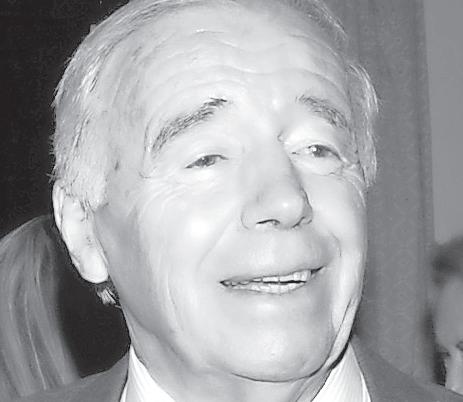
The prime minister explained the existence of a new era for defence and security, as Russia was waging war on the continent of europe while also probing Britain’s defences at home with daily cyber attacks. Global instability, he said, affected economic security by driving down growth and pushing up prices and the cost of living. So, with dangerous times ahead, the review, which
the current government had set in course shortly after being elected in July last year, constituted a blueprint and an ambitious roadmap for much-needed reform.
The review recognises the requirement for the UK and other european governments to invest in their own defence. It provides a sobering analysis of the threats facing Britain and proposes a comprehensive plan to deal with them. These are summed up as putting NATO first, keeping up with the pace of innovation in weapons’ procurement and ensuring the UK is “war-fighting ready” – including retention of the nuclear deterrent – particularly if Britain is forced into war.
Starmer reminded his audience that his government had announced recently the largest sustained increase in defence expenditure since the Cold War by committing to spending at a level of 2.5 percent of GDP and an ambition to reach

hAvING written in last week’s column about Germany’s new involvement in Ukraine and more widely – now being called Germany’s military rebirth – it was interesting to learn of the new Chancellor’s later visit to Washington and to hear him express his satisfaction with his meeting at the White house. In a subsequent informal encounter with the press, Friedrich Merz said that his meeting with President Trump laid the foundation for a sound working relationship with him in the future. he said that he was extremely happy with the visit and got on well with the US president at a personal level.
This development prompted thoughts about the significance of bilateral meetings compared to summits of world leaders which, the cynics say, all too often give them an opportunity for grandstanding instead of decision-making, leaving diplomats behind to clear up differences at a later date.
With this in mind, there are two significant world summits due this month.
One is next week’s Group of Seven (G7) meeting in edmonton, Alberta, hosted by Canada which holds the current G7 presidency.
Since it has limited attendance as a small informal grouping of seven of the world’s advanced economies and the european Union that meets annually to discuss global economic and geopolitical issues, the annual G7 summit is reputed to be generally productive. The other is the NATO summit due to take place later this month (see separate article on this page). Its 32 member countries meet to discuss security and political issues and make decisions by consensus.
With such high level collective gatherings, as well as constant bilateral contacts, commentators seem to be finding it hard to understand why the socalled “great and good” of the world are failing to bring the Ukraine war to an end – when it is clear that Putin was the aggressor who attacked another sovereign nation – and to achieve a ceasefire and end to hostilities in Gaza. The Ukraine conflict has surely destroyed the myth of Russian military prowess. In some eyes, it has also exposed the complacency of europe’s ruling elite. For decades, Western politicians have relied on America to protect them while their emphasis has been on financing generous welfare states, and excessive bureaucracies like that in Brussels. But now, with Trump’s ‘America first’ policy, reality has sunk in that european countries should be responsible for their own security protection; and attitudes are changing, including in Britain with its new strategic defence review (see separate article).
Meanwhile, there have been reports of Germany developing plans for expansion of its bunkers to protect people in the event of bombing attacks amidst warnings that the state should be prepared for an attack by Russia in the coming years. In this context, it has been fascinating to read about the warnings by Jeffrey Sachs, the renowned American economist and public policy analyst and a professor at Columbia University, of the dangers of a nuclear disaster and Armageddon as a consequence of the Ukraine war. he has called for an immediate end to the conflict and warns that the world is
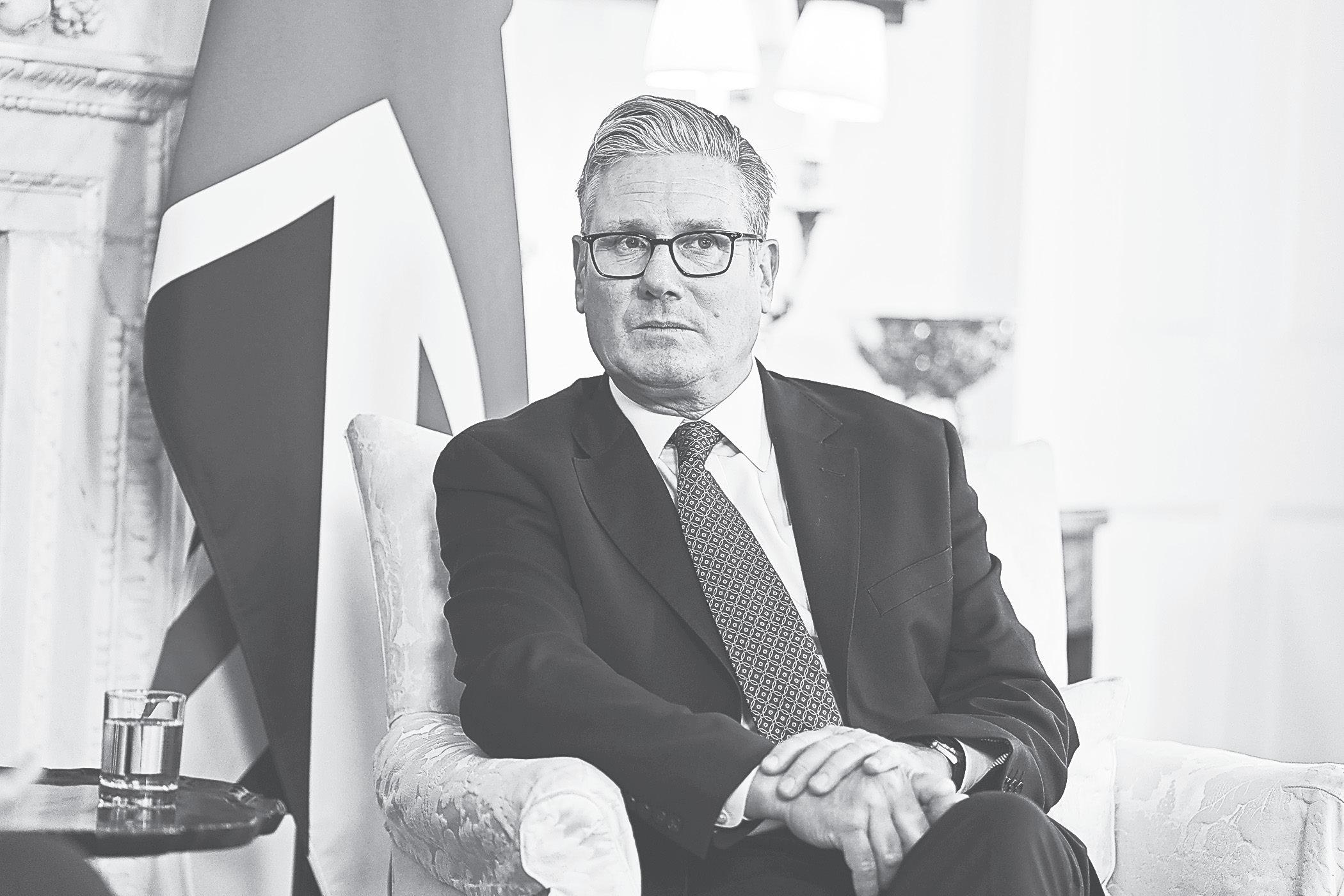
three percent in the next Parliament. This would enable the UK to take greater responsibility for its collective self-defence within NATO.
Moreover, according to a general briefing at the launch of the review, there has apparently been a shift of mindset under the current UK government to put security and defence at the front and centre of its basic principles and practices in order to involve the whole of society in ensuring that the country is in a state of war readiness. But for the government to be talking in such stark terms at this stage about readiness for war will surely be of concern to some people who are unaware of the seriousness of current developments.
official assurances, there is public scepticism about the extent to which such new cooperation can be put into practice.
From a study of the UK press, it is evident that many in Britain have doubts about implementation of all this despite the positive and encouraging remarks about the defence review by Starmer and his Cabinet colleague, the Secretary of State for Defence, John healey.
closer to nuclear war than it has ever been in history. he also contends that, in reality, the politicians are doing little to try to lessen this danger. he condemns, in particular, Ukraine’s surprise destabilising attack on Russia’s strategic nuclear bombers. he says that an attack on such a state’s nuclear strategic assets could be viewed as a threat to the nation’s survival and could incite a massively disproportionate response.
To appreciate properly Sachs’s approach, one needs to delve more into the details of his observations. But, at the same time, it is also interesting to read the latest views of retired US general Jack Keane, who served as vice chief of staff of the US Army and is now a respected national security analyst. From what I have read, he appears to consider that the way to persuade Putin to come to the negotiating table is to provide Ukraine with more American weapons and military assistance and to increase sanctions in order to show him that he cannot win in Ukraine. Incidentally, while listening to an interview with Jeffrey Sachs, I was surprised to hear him condemn Britain as “the gangster of the 19th century” because of colonialism.
even taking into account academic hyperbole, I wonder whether he has read a splendid book about the British empire by Niall Ferguson, who is one of the best British modern historians and a prolific writer. he has held academic posts at Oxford, harvard and Stanford. his book provides a wonderfully informative and balanced account – both the good and the bad – of British colonialism.
Thus, it seems that the review has reflected what is essentially a new way of government thinking about the UK’s defence amid a rapidly changing geopolitical picture. So there will be an emphasis on driving jobs and prosperity through cooperation between industry and government involving procurement reforms in relation to weapons and military equipment and supplies.
This new approach is supposed to set the path for the next decade and beyond. however, notwithstanding
In the longer term, will a Labour government really go along with this proposed drive for greater realism and resolve? Commentators are already wondering whether the Labour party will pay more than lip service to the idea of stronger national defences. Will the armed forces, they ask, actually receive the extra cash when there are huge pressures on government spending and the Left of the party will probably not tolerate priority being given to defence above welfare, the National health Service and public sector wages?
Interestingly, attitudes seem to be changing in other european capitals. There is now growing pressure from the US government to persuade them to increase their NATO military budgets – and some are doing so – even
higher than the well-known existing level of two percent of GDP. Furthermore, reportedly, Secretary General Mark Rutte will be formally unveiling a proposal at the NATO summit in The hague at the end of this month to raise the spending level for member states to five percent – 3.5 percent on defence capabilities and an additional 1.5 percent on broader security-related investments. It comes as no surprise that there are also reports that the US president is pushing for this and is also said to be threatening to withdraw some American troops from europe.
Finally, since Britain’s Strategic Defence Review sets out what needs to be done, it seems to be widely assumed that, by presenting it publicly last week, the prime minister has indicated the government’s agreement to it. Given the UK’s security needs and the soundness of the review’s recommendations, it appears unlikely that there will be any serious objection by the general public. So, presumably, the next step will be for the government to put up the money and make new commitments to longer term future expenditure – in response to the new era of defence and security referred to by the prime minister.
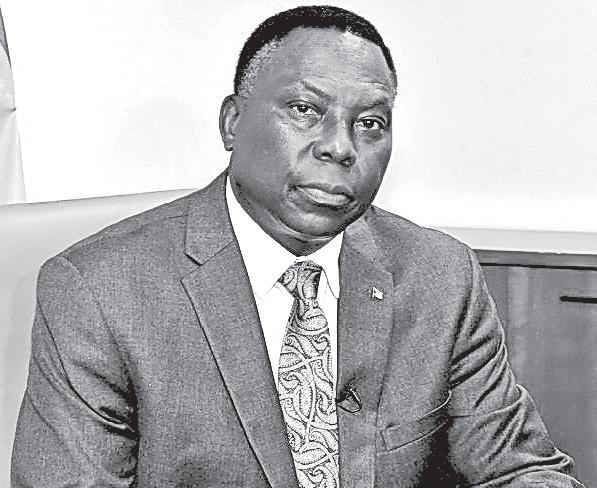
WITh much sadness, I should like to take the opportunity of this column to draw attention to the excellent article in last Thursday’s edition of The Tribune , written by ‘Simon’ under the heading Front Porch, about the public service and Joshua Sears. his passing has come as a great shock personally since I had not been aware of his illness. This article describes him so well, and has obviously been produced with much respect and goodwill. having got to know
Joshua quite well over the years, I wholeheartedly agree with this unstinting praise for him as a public servant and experienced and able diplomat of the highest calibre – a person of sound judgement who always spoke with the voice of reason. he clearly served his country exceptionally well as an outstanding public servant and consummate professional. he was widely knowledgeable about a host of different subjects and always seemed to me
during our many discussions to be impressively well informed. he was also a very nice person who consistently displayed kindness, decency and integrity as a wonderful human being. Joshua Sears was surely an example and role model for the rest of us, and I only wish I could have known such a fine person better. he will surely be missed beyond measure by so many. My wife and I would like to offer deepest condolences to his whole family.
By FAY SIMMONS Tribune Education Reporter jsimmons@tribunemedia.net
STUDENTS from St John’s College claimed the top prize in the inaugural RBC Young Leaders 2025 programme with their innovative underground water purification system, earning $15,000 to bring their vision to life.
Their eco-conscious project, designed to provide clean, purified water for both the school and the surrounding community, stood out for its practicality, sustainability, and impact.
The six-member team at St John’s College emphasised water as a basic human necessity and set out to improve access to this critical resource through a green, community-focused approach.
Their win also included special recognition for Best Team Written Proposal, Best Team Oral Presentation, and Most Innovative Proposal.
Students from Temple Christian School secured second place and a $10,000 prize for their self-sustaining greenhouse project, which features a drip irrigation sprinkler system aimed at promoting food security and environmental responsibility.

CI Gibson Senior High School rounded out the top three, winning $5,000 for their composting technology project, which utilises an aerated static pile (ASP) system to manage organic waste sustainably.
Held for the first time in The Bahamas, the RBC
Temple Christian student Ashleigh Knowles was also recognised with the Best Individual Presenter award for her outstanding delivery and communication skills.
Young Leaders programme invited five schools to participate in a three-month challenge launched in February.
Students were tasked with developing viable, environmentally and socially impactful projects under the theme “Sustainable Future”. Alongside their project

BAHAMIAN student
Riley Symonette is preparing to begin his studies at UWC Changshu in China, becoming one of a growing number of young Bahamians choosing to pursue education in Asia. To celebrate the milestone, Riley and his family were hosted by Yan Jiarong, Chinese Ambassador to The Bahamas, at the Chinese Embassy. Ambassador Yan congratulated Riley on his acceptance, highlighting China’s expanding role as a global education destina tion. She encouraged him to



immerse himself in Chinese culture and serve as a messenger of China-Bahamas friendship.
Riley, accompanied by his mother and grandmother, expressed sincere gratitude for the Embassy’s support.
He shared that turning down offers from US universities to study in China was a carefully considered and meaningful decision.
Riley’s journey reflects the broader growth in China-Bahamas educational ties. Each year, China offers scholarships and training opportunities to young Bahamians, with





nearly 50 individuals traveling to China so far in 2024 alone. These initiatives are part of ongoing efforts to deepen cultural exchange and build lasting people-topeople connections.
Applications for Chinese government scholarships typically open in November and close by March, with opportunities covering full tuition, housing, and living expenses. The Chinese Embassy also organises educational trips and student summer camps, including one this August for students from San Pedro International School.
work, they also gained valuable skills in financial literacy, time management, environmental awareness, and public speaking.
Ericka Rolle, RBC’s managing director and vice president of Personal Banking for The Bahamas and Turks & Caicos, commended the students for their creativity and leadership.
“Our Young Leaders have shown that they are ready to lead the charge,” she said.
“They’ve demonstrated that with determination, creativity, and purpose, they can turn ideas into impactful solutions for their communities and beyond.”
Keynote speaker Amber Turner, environmentalist
and sustainability advocate, inspired students to think beyond the present.
“This year’s theme of ‘Sustainable Future’ isn’t just a buzzword — it’s a challenge,” said Ms Turner.
“Sustainability is about fairness and ensuring future generations inherit a world full of opportunity. This leadership starts with you.”















By JEFFARAH GIBSON Tribune Features Writer jgibson@tribunemedia.net

FOR generations, fatherhood was boiled down to one word: provider. Bring home the money. Pay the bills. Keep the lights on.
But today’s fathers are pushing back on that narrow definition. They know that true fatherhood takes more than opening your wallet it takes mental presence, emotional intelligence, spiritual balance, and daily decisionmaking that shapes a child’s identity. Being a father now means holding it all together not just financially, but mentally. And in the quiet hours, when no one’s watching, that weight can feel unbearable.
When Kevin Rolle became
a father at 29, he made himself a silent promise: he would never let his children go without. He worked overtime, skipped sleep, said yes to every extra job. From the outside, he looked like the model dad who was steady, reliable, and always providing.
But on the inside, Kevin was not his best self.
“I would park outside the house and just sit there. I wasn’t crying, but I wasn’t okay either. I was too tired to think, too numb to care. I was giving everything, and it still didn’t feel like enough.”
It was the first time Kevin realised something most men are never taught: to be a strong father, especially a strong
provider, you have to be mentally well.
More Bahamian fathers are beginning to admit that providing for family goes far beyond money. Devon Clarke said: “Yes, I pay the bills. But if I’m walking around drained, snapping at everyone, or zoned out when my son’s talking to me what am I really providing?”
“I started talking not because something was wrong with me, but because I realised I was carrying too much without help. I wanted to be more than a pay cheque.”
This idea that provision without presence is not enough is resonating deeply with a generation of men who are trying
to father differently than their own fathers. Jason Dean, said he does his best to stay in a healthy mindset because parenting is not easy.
“You can give your child everything and still scar them if you don’t know how to talk, how to listen, how to stay calm,” he said.
“I’ve had to train my mind the same way I trained my body to breathe through frustration, to choose teaching over yelling. That’s mental work,” he told Tribune Health.
David Dean said there are no days off which requires great mental capacity.
“There’s no off switch when you are a father. Even when you are tired, you push. But I
have learned the hard way if your mind goes, everything else follows.”
That lesson is one David said he will never lose sight of.
“Mental wellness is not a luxury. It’s essential. And asking for help does not make you less of a man.
More than anything, as Father’s Day approaches and they are reflective, these Bahamian fathers say they want to be remembered not just as providers, but as fathers who were present, aware, and emotionally connected.
“Sometimes the strongest thing a father can do is rest, reflect, and rebuild his mind. Love is true provision,” David said.
OVER your lifetime, the odds of developing a cancerous brain tumor are less than one percent. Usually, symptoms like a headache or confusion are just your body’s way of telling you to hydrate or sleep more.
But rarely, these symptoms can signal a bigger problem.
Unfortunately, the warning signs of a brain tumor can be as diverse as the brain’s endless list of responsibilities. “There is no specific sign for a brain tumor,” says neurosurgeon Gene Barnett, MD. “A brain tumor can present with many different signs and symptoms, depending on where it is located.”
With more than 120 types of brain tumors, symptoms run the gamut from none at all to major red flags. Ultimately, how your body sounds the alarm depends on where the tumor forms, what part of your body the effected area of your brain controls or how big the tumor is.
But to know when a symptom really spells trouble, you need to know your own body. Changes in your health can be just as telling as the symptom itself.
If you experience one or several of these signs, Dr Barnett recommends seeing a medical professional: seizures, changes in your mental status, personality or behavioural changes, clumsiness, visual problems, limb weakness, or headaches.
A tumor can make your brain’s neurons fire wildly, leading to seizures.
Perhaps you’ve had confusion, one too many “senior moments” or more trouble than usual figuring out a restaurant bill. Your mental abilities are personal to you and so are any changes to them.
“Frontal lobe tumors, in particular, can cause happy, bubbly people to develop a flat affect or cause some normally quiet people to become more talkative,”
explains Dr Barnett. “They can also cause a loss of inhibition.”
Brain stem tumors may lead to a loss of balance or clumsy movements.
A tumor in your brain area that controls eyesight may affect your vision. Blurred, double or even loss of vision can be signs of a brain tumor.
Losing strength or weakness in an arm or leg may be a brain tumor symptom.
“But most headaches are not the result of a brain tumor,” Dr Barnett assures. “Brain tumor headaches tend to persist for more than a few days, are associated with nausea or vomiting or occur early in the morning.”
Something most people don’t know is that the most common brain tumors don’t actually start in your brain. Brain metastases, or metastatic brain tumors, spread to your brain from other parts of your body — most often from your lungs, breasts, skin, kidneys or colon.
“A person with a known history of these cancers who develops any of these neurological symptoms should be evaluated,” Dr Barnett says. If you’re diagnosed with a brain tumor, Dr Barnett says you’ll get the best care at a brain tumor center of excellence.
“These centres specialise in multidisciplinary treatment for brain tumors,” he explains.
“You have neurosurgeons who treat patients with brain tumors every day of the week. You also have radiation oncologists and neuro-oncologists or medical oncologists who primarily treat patients with brain tumors.”
These centres usually offer opportunities to participate in clinical trials, too. So, if a tumor has limited treatment options, a brain tumor centre can give you access to promising new drugs or immunotherapies that may effectively treat it.


By ALESHA CADET
Tribune Features Reporter
WHETHER it’s belting out your favorite gospel track, vibing to old-school R&B while cooking, or throwing it back to dancehall classics for a spontaneous living room whine, music has a way of pulling us out of a funk and putting us in a better headspace.
And for many Bahamians, curating a personal playlist has become much more than just a way to
pass time, it’s somewhat of a mental health ritual.
“Gospel music is everything to me. I don’t care what kind of day I’m having, once I press play on Maverick City or Tasha Cobbs, my whole mood changes. That’s how I reconnect with myself and with God,” said Melissa Johnson, a 35-yearold entrepreneur. For those who grew up on soulful slow jams, oldschool R&B remains a
comfort genre; a go-to for chores, relaxing evenings, or even a little romantic nostalgia.
“You can’t tell me some good old Mary J Blige or New Edition don’t calm you down. Especially since every time you turn on the radio, it’s some raga raga I can’t seem to keep up with. Give me old school any day. I also like watching the music videos to old songs. They don’t make create
PHYSIOTHERAPY plays a crucial role in helping people recover from injuries sustained during accidents, particularly car accidents.
These injuries can range from minor soft tissue damage to severe musculoskeletal trauma, and often require a comprehensive rehabilitation approach. Here’s an in-depth look at how physiotherapy can aid in recovery from accident-related injuries: Initial assessment and treatment planning
Physiotherapists begin with a thorough assessment of the patient’s condition, which includes:
• Detailed history taking: Understanding the mechanism of injury, immediate symptoms, and any treatment received so far.
• Physical examination: Assessing range of motion, strength, neurological function, and overall functional capacity.
• Pain assessment: Evaluating the nature, intensity, and pattern of pain.
• Review of medical records: Including any imaging studies (X-rays, MRIs, CT scans) and reports from other healthcare providers.
Based on this assessment, the physiotherapist develops a personalized treatment plan tailored to the patient’s specific injuries, needs, and goals.
Pain Management: Managing pain is often a primary concern for accident victims.
Physiotherapists use various techniques to alleviate pain:
• Manual therapy: Gentle joint mobilisations and soft tissue techniques to reduce pain and improve mobility.
• Modalities: Application of heat, ice, ultrasound, polychromatic light therapy, decompression therapy, electrical stimulation, dry needling, cupping,

Hannah Foster Middleton
BSc (Hons) Physiotherapy, MCSP, SRP
shockwave therapy are all ways that physiotherapists can manage pain and inflammation.
• Education on pain science: Helping patients understand their pain and develop coping strategies.
• Gentle exercises: Introducing movement in a controlled manner to reduce fear and anxiety associated with pain.
Restoring range of motion
Accident injuries often result in restricted movement due to pain, swelling, or protective muscle spasms. Physiotherapists work on restoring normal range of motion through:
• Passive and active-assisted stretching exercises.
• Joint mobilisation techniques.
• Soft tissue massage, trigger point release, and myofascial release.
• Gradual introduction of active movements as tolerated.
Strengthening and stability
As pain decreases and range of
magic like that anymore either. Do you remember the Micheal Jackson music videos? They were like mini movies,” said Patricia Fox. Moreover, there are some others who turn to reggae and dancehall to inject energy and positive vibes into their day. The rhythm, the lyrics, the memories tied to certain songs, all plays a role in lifting spirits.
“Sometimes I’ll just blast old Buju or Beenie
Man and dance like I’m 19 again. It’s a full-body release for sure; my cracking bones sure tells me so. I can feel the stress leaving me with every beat. Mind you, the stress may come back after the song is over, but the feeling that comes with listening to music, is unmatched. Especially the songs with meaning. No cuss words, just rhythm and flow,” said 38-year-old Shanelle Christie.
Even the occasional Soca track gets a play for those moments that call for pure joy.
“I don’t listen to Soca every day,” admitted Christina Gibson, “but when I do, it’s like an instant celebration. It puts me in a good headspace, especially when I need an energetic push to get moving. People say music is therapy, and I really believe it is. I believe Bahamas Carnival is taking place this weekend if I am not mistaken. I’ll be right out there roadside, enjoying the tunes,” she said.

motion improves, focus shifts to rebuilding strength and stability:
• Progressive resistance exercises are tailored to the individual’s capacity.
• Core strengthening exercises to improve overall stability.
• Exercises targeting specific muscle groups affected by the injury.
• Functional strengthening exercises that mimic daily activities or work-related tasks.
Addressing specific injuries Car accidents can result in a variety of injuries, each requiring specific treatment approaches: Whiplash:
• Gentle neck mobilisations and exercises.
• Decompression therapy
• Postural re-education and ergonomic advice.
• Specific exercises to improve neck strength and endurance.
Back injuries
• Core stabilisation exercises.
• Manual therapy for the spine.
• Decompression therapy
• Education on proper body mechanics and lifting techniques.
Fractures
• Post-immobilisation rehabilitation to regain strength and mobility.
• Graduated weight-bearing
exercises as appropriate.
• Functional training to restore normal movement patterns.
Soft tissue injuries
• Peace & Love protocol for acute management (Protection, Elevation, Avoid anti-inflammatories, Compression, Education; Load, Optimism, Vascularisation, Exercise).
• Progressive loading of injured tissues to promote healing.
• Scar tissue management and mobilisation.
Balance and proprioception training
Accidents can disrupt the body’s sense of balance and position. Physiotherapists address this through:
• Static and dynamic balance exercises.
• Proprioceptive training using unstable surfaces or specialized equipment.
• Vestibular rehabilitation for those experiencing dizziness or vertigo post-accident.
Functional rehabilitation
The ultimate goal is to restore the patient’s ability to perform daily activities and return to work or sports. This involves:
• Task-specific training that simulates work or daily life activities.
• Gradual progression from
simple to more complex functional tasks.
• Addressing any compensatory movement patterns developed post-injury.
Cardiovascular conditioning
Prolonged recovery periods can lead to deconditioning. Physiotherapists help maintain or improve cardiovascular fitness through:
• Low-impact aerobic exercises appropriate to the patient’s condition.
• Interval training as tolerated.
• Incorporation of cardiovascular elements into functional exercises.
Psychological support and education
Accidents can have significant psychological impacts. Physiotherapists provide support by:
• Educating patients about their injuries and the recovery process.
• Setting realistic goals and celebrating progress to boost motivation.
• Addressing fears and anxieties related to the accident
As you can see, recovering from injuries especially those sustained during a car accident are complex and varied but physiotherapist are perfectly situated to address any and all issues. Do not suffer in silence, help is available.
The class and that moment opened her eyes to how the law could be a tool for justice.
“Sitting on my parents’ bedroom floor, I watched on the news as these events unfolded, and an interest in social justice was sparked. I wrote legal memorandums on these court cases in my law class, and was able to marry my love of social justice with law.”
Her goal is to become an attorney and eventually a judge, using her voice to advocate for justice and speak truth to power. With her degree in hand, a powerful village behind her, and faith in God leading the way, Zaria is walking boldly into the next chapter of her life. Throughout it all, she
credits her parents, professors, and mentors at NCCU for their guidance and support. But her foundation is rooted in faith. “I know that I am only where I am due to the grace of God, who has carried me every step of the way,” she said. To young girls everywhere who feel too young, too unsure, or too overlooked to chase big goals, Zaria offers this powerful reminder: “Let no one despise you for your youth. Your perspective matters. Your dreams are valid. And yes, you can walk a road that hasn’t been walked before if you let God lead.”
As she enjoys a wellearned summer of travel, beach days in The Bahamas, and time with family and friends, Zaria is gearing up to take on law school with excitement and vigor.
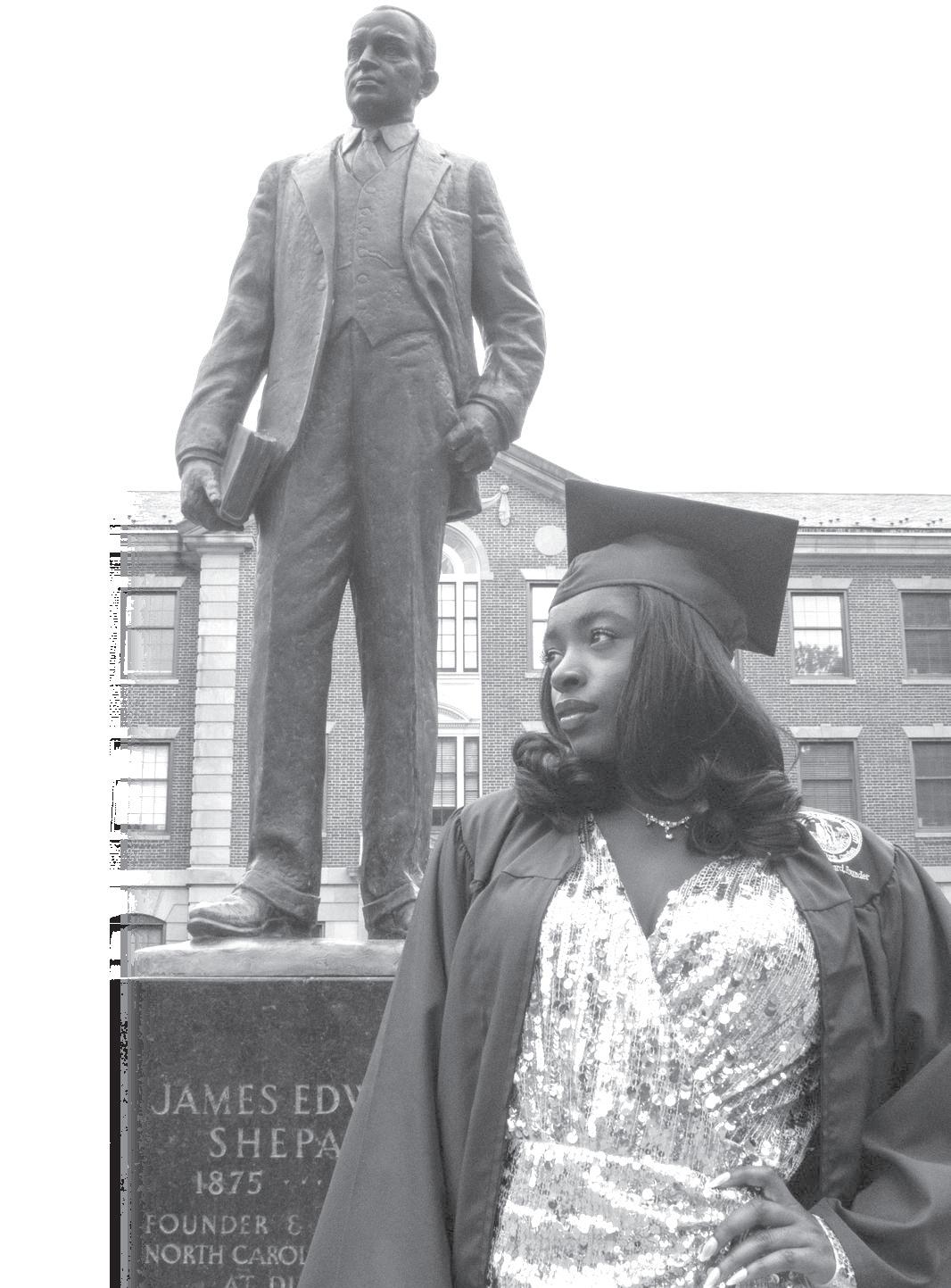
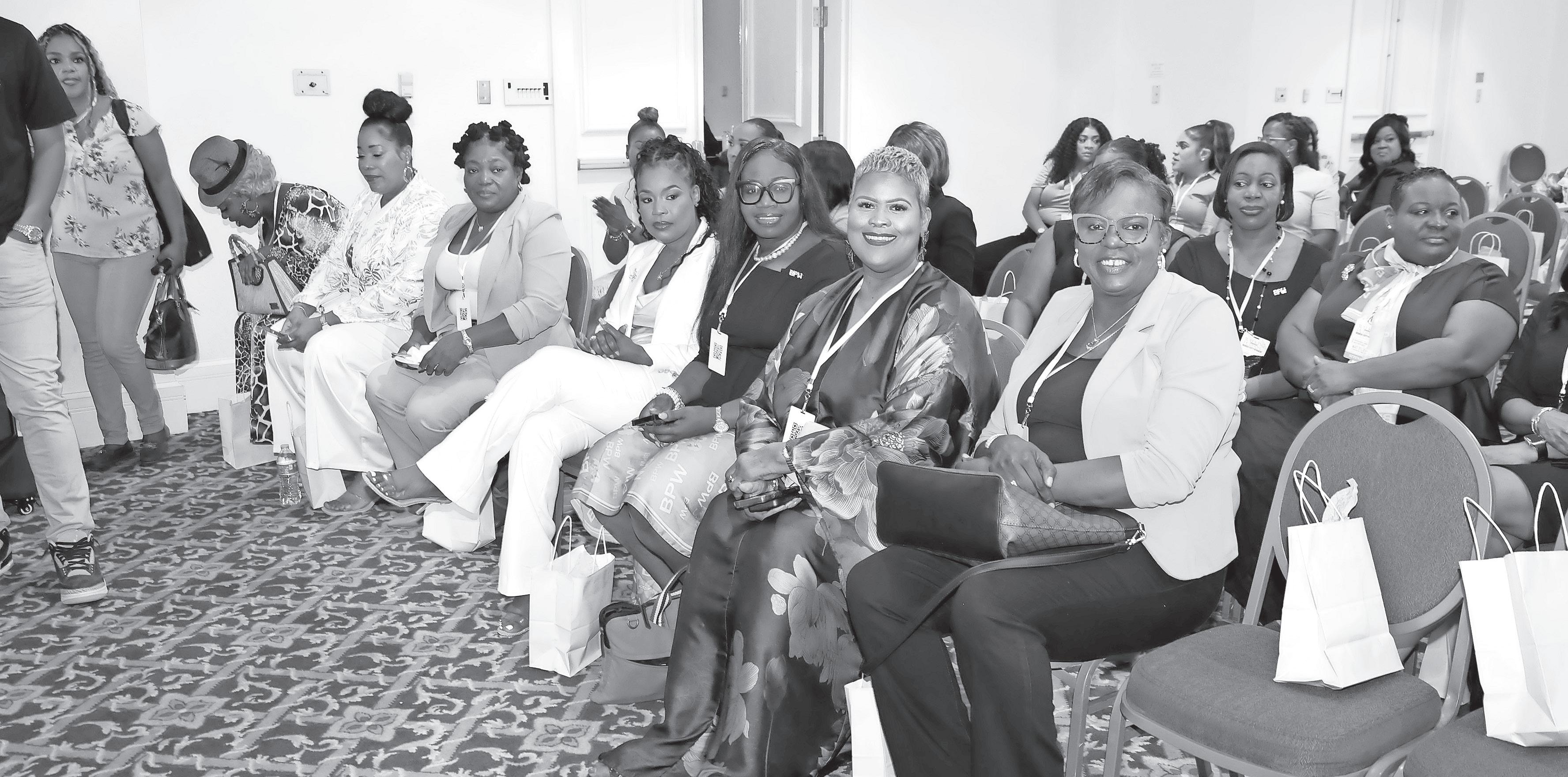



By ALESHA CADET Tribune Features Reporter acadet@tribunemedia.net
AT just 17 years old, Calpurnia Campbell took a leap of faith, and a powerful vision - and turned it into a business.
That bold move birthed Create The Beauty, a full-service brand and marketing consultancy that today helps entrepreneurs craft their identity, sharpen their strategies, and elevate their impact.
“My inspiration for launching Create The Beauty came right after graduating from senior high school. I remember thinking, My life starts now, and with that mindset, I created Create The Beauty, originally known as CTY Masterpiece,” said Calpurnia.
It was during a one-week student work experience at Island TV Studios that she first caught a glimpse of the creative industries. Calpurnia rotated between journalism and production, and what she saw sparked something within her.
“It opened my eyes to the fact that creative industries exist in The Bahamas, and
they’re profitable. Before that, I honestly had no idea,” she shared. Long before she had a business card or official title, Calpurnia was unknowingly laying the foundation for her path.

“Honestly, the most fulfilling part of the process for me is creating marketing campaigns for businesses. I prefer to work with clients over the long term because I love seeing their growth and analysing what works and what doesn’t,” she said.
“Growing up, I was always selling something for family members, designing birthday cards, writing inspiring poetry for loved ones, and fascinated with mixing colours and shapes. I didn’t know it then, but all of those small moments were shaping me for this path,” she recalled.
Today, Create The Beauty offers everything from content creation and brand positioning to influencer strategy and public relations. But for Calpurnia, the magic happens when she’s building campaigns that allow brands to grow and evolve.
Her approach is rooted in both creativity and care.
“I genuinely love helping others, and this part of my work allows me to fulfill that desire in a strategic, impactful way,” she added.
Legacy-building is a core part of her company’s philosophy, and to Calpurnia, it’s more than just a buzzword. It’s about setting the stage for something that endures.
“To me, crafting a legacy means building something that lasts beyond you; creating a business that’s strategically positioned to be trusted, to deliver meaningful customer
experiences, and to be easily recognised.
“What will your business be remembered for? What does your brand represent? And how do people connect with it? That’s the lens through which we approach every client project,” Calpurnia said.
For women looking to bring their ideas to life, Calpurnia offers honest and empowering advice: “If you have the idea, research it and ask questions. Reach out to people already in the field and use the resources you have,” she said.
She knows firsthand the value of self-education and taking imperfect action: “If you don’t seek information, practice what you learn, and apply it (whether it’s perfect or not), you won’t get the feedback or experience you need to grow. This journey isn’t easy. It’s important to have a plan, but you also have to be adaptable.”
And when it comes to dream collaborations? Calpurnia has her sights set on one of The Bahamas’ biggest entrepreneurial icons.

“I would love to collaborate with Sebastian Bastian. I envision an unfiltered and educational two-part series breaking down why sales never stop and how to reach your first million,” said Calpurnia. For her, it’s all about giving entrepreneurs the tools, and the truth, they need to thrive. “There’s no universal blueprint, but
there are definitely timeless strategies when it comes to building multi-figure businesses,” she added. From bold beginnings to brand brilliance, Calpurnia Campbell is proof that when purpose meets passion, there’s no limit to what a
boss can build.






























































































































































































By CARA HUNT Tribune Features Writer cbrennen@tribunemedia.net
THE Miss Bahamas Teen Organisation recently crowned two young Bahamians to represent the country for the 2025/2026 pageant year.
The young ladies have a strong history of community service and giving back and each will spend their reign inspiring the next generation of young Bahamians.
For Chloe Walters, becoming Miss Bahamas Teen is more than a dream, it’s a calling to empower, inspire, and lead with purpose.
“After competing twice, this victory is a true reflection of my hard work, faith, and growth,” she said.
Chloe wants to use her reign to give back to the community.
“Through my platform, S.L.A.Y: Self-Love and You, I will host fundraisers and outreach events to give back to the communities that raised me. I would like to organise clothing drives and bless young individuals with self-love techniques through seminars.”
Chloe said she is also passionate about organising fashion shows for young people so they can feel their best and showcase their beauty.
“These events will promote confidence, self-worth, and intentional living among young people. My mission is to ensure every youth I meet feels seen, valued, and inspired. I’m proud to represent my country and grateful for the opportunities yet to come. I put all of my future challenges and successes in Gods’ hands because when you give God something to work with, He opens the right doors,” she said.
Morgan Dillet is the newly crowned Miss Teen Commonwealth 2025, and first princess.
Morgan is a swim teacher at her father’s company, The Swim Gym, and plans to draw on that expertise to carry out her platform, Swim For Life.
She said Swim for Life promotes water safety and swimming

education for youth across the islands.
In the coming months, she plans to host free community swim clinics, partner with schools, and build a volunteer network to expand her outreach.
With a heart for service and a passion for youth empowerment, Morgan is committed to making her reign impactful, inspiring, and centered on creating lasting change throughout the Commonwealth.
“I am motivated by my faith, my family, and my passion for making a positive impact. Knowing that I can create change and inspire the next generation keeps me striving for excellence. I am also motivated by challenges — they push me to grow, learn, and become a better version of myself,” she said.
Hadassah Taylor, from St Andrew’s International school, was named the organisation’s second princess. She walked away with many awards, one being the presidents award and the congeniality award, along with congenitality.
Hadassah who has participated in environmental clean-ups and volunteered with mentally disabled children and at the Bahamas Humane Society, says this experience has been life changing.
“I am naturally soft-spoken and reserved, but through this pageant, I have gained the confidence to step out of my comfort zone and let my voice be heard,” she said.
The Miss Bahamas Teen Organisation mission is to bring out the personal best in Bahamian young ladies as they seek to achieve greatness by cultivating their self-image, passions, and education in an environment that encourages the pursuit of purpose, and discipline and supports the strengthening of their character.
The pageant is open to Bahamian young ladies between the ages of 14-18 standing 5ft 5in or more (with heels) and having a GPA of no less than 2.5.
Contestants compete in several areas including costume, talent, evening gown, fitness, swimsuit and a judges interview.
By JEFFARAH GIBSON Tribune Features Writer jgibson@tribunemedia.net
AFTER becoming the youngest in the history of Winston Salem Christian Schoo to graduate at age 15, Zaria Hanchell, now 18, is walking across the stage with top honours and a Bachelor’s Degree in political science. The young Bahaman woman is on a mission to make her mark, moving in grace and what she calls divine purpose.
Zaria comes from a powerhouse family steeped in faith and leadership. Her grandparents are Bishop Walter Hanchell and Elder Minalee Hanchell, both well-known spiritual leaders in The Bahamas. Her parents, Dr Tejado and Dr Victoria Hanchell, are both educators and ministers who emphasised the importance of faith and education from day one.
Zaria’s journey began on the fast track. She was born three weeks early,
and was reading and writing in cursive by age three. She was homeschooled for a portion of her elementary years where her mother tailored a sixthgrade curriculum for her, even while she was in the fourth grade. This continued into the seventh grade, where Zaria was more challenged. She later skipped eighth grade, starting high school at just 13. When the pandemic hit, Zaria leaned into the skills developed through homeschooling and accelerated her course load by taking early college classes during the summer and loading up on core subjects. By 15, she had fulfilled all her requirements and made the bold decision to graduate early and head straight to college. That leap landed her at North Carolina Central University (NCCU), where she earned a full ride scholarship through the prestigious Cheatham-White Scholars programme. Over the next three years, she not only maintained
stellar grades but also studied abroad in countries like Italy, Greece, Brazil, and Spain, appeared on the cover of NCCU Now Magazine, and was honoured with the University Academic Achievement Award.
“Being younger than my peers has not proved a hindrance for me. I have been able to excel academically and socially, and I believe surrounding myself with the right people is a large part of that,” she told Tribune Woman.
And while Zaria’s résumé is packed with accomplishments, what truly drives her is purpose. Her love for law was sparked during a 2020 summer course at American University right in the heart of the pandemic and amid global protests for social justice following the murders of George Floyd, Breonna Taylor, and Ahmaud Arbery. She was just 14 at the time, sitting on her parents’ bedroom floor, watching the world shift.

